#i would not rob my characters of the existential experience
Explore tagged Tumblr posts
Note
Hey! It's been a bit! But for that send a passage and get commentary ask game thing! I wanted to send you one but it's been so long that I don't remember what any of the chapters are ha 😅 But! I do have this scene screenshotted because it was genuinely one of my favorite from the entire fic! I used to have more of it but I think they got lost when I changed phones.

But just Aunt Cass' emotions in this scene. I loved them so much. So if you've got anything to say about these scene, I'd love to hear!
I'm so glad someone responded to that and yeah it took me a bit to respond back just cause it's the weekend.
So I've had Aunt Cass adopting Varian planed out for awhile. Before even thinking up this scene.
My goal is for her to present the papers to Varian on his birthday during S3. Not only does this give him more reason to stay, upping the tension on his internal conflict, but it's also just a natural progression of the characters and their dynamic.
Of course Aunt Cass would want to officially adopt him. She's been foster parenting him for over six months now and knows that him returning home or his dad coming back is not really feasible, given what she thinks is a war going on. (and she's not really wrong about that assumption)
Adopting him just gives Varian legal protection, citizenship, and a safe place to always stay no matter what. He's already family, so it makes sense to formalize that.
As for this particular scene, I decided to reveal the adoption plans early rather than having the audience finding out with Varian later, is because I wanted to give Eugene a moment of realization.
In the show, Eugene's background as an orphan isn't really utilized well. He follows along too much with Frederic's, and later Rapunzel's, bullshit when he should naturally have a different and more nuance perspective than either of them due to his experience.
I'll always insist that his animosity towards Varian in season one, especially during The Alchemist's Return was completely OOC, and the only way to justify it is for his fear of Rapunzel's safety over riding his usual empathy.
But here, Rapunzel is not in danger.
Heck, even Corona isn't in any immediate trouble as far he knows. The rocks exist, sure, but they've always manged to stop them in some way thus far and they're more of a looming existential threat rather than something he has to face in a fight.
Which means, Eugene has the the time to think. To re-evaluate.
Varian is Corona's most dangerous criminal. That is a fact. But it's also fact that he's just a poor orphan who turned to crime to survive. Same as Eugene.
And now, unlike Eugene, he's been given an opportunity to have a home and a parent who loves him. Who is he to rob a child of that opportunity? Who is he to tell this woman that the son she loves needs to be arrested again for 'the greater good'? What right does he have to exercise judgment over someone for doing what he had to do as a kid?
This entire scene is meant to be a wake up call to him. Even if it's not enough to get him to change his mind completely, it will plant the seeds for later.
#rnr#of rocks and robots#tangled#tangled the series#eugene fitzherbert#aunt cass#varian#big hero six#big hero 6 the series#fanfic ask
18 notes
·
View notes
Text
'All of Us Strangers is a foray into existential loneliness, and all that entails. The movie follows Adam (Andrew Scott), as he navigates life as a gay man in London. He has the loneliest of jobs (a writer), and spends more time looking inward than socialising. We find out through the course of the movie that Adam lost his parents at age 11, and has never really recovered from that trauma. This seeps into his troubles with relationships as he happens to meet Harry (Paul Mescal). They develop a relationship, but Adam finds it challenging to let go of the past that keeps haunting him.
It’s a devastatingly sad film – made all the more so because the lead character’s struggles are so relatable. Losing his parents at that age has made Adam profoundly lonely, and his mind is often in the past, as he daydreams about the childhood that was wrongfully snatched away from him, and all the experiences he was robbed of.
Real life and this imaginary world he’s conjured up get muddled together, and he starts seeing visions of his parents – as they were around the time they passed away. Adam ‘visits’ them, and has conversations about things he never got to when they were alive. He comes out to the both of them separately, and it’s in these conversations that the film really, really shines. The reaction from the parents isn’t as rosy as one would imagine, and we are reminded that these were real people, with their own prejudices and lived realities. Jamie Bell and Claire Foy offer natural performances that elevate these short segments.
But the beating heart of this film is Andrew Scott’s exceptional work in the lead role. The film rests entirely on his shoulders, and he’s adept at conveying genuine pain and anguish, scattered with moments of hopeful compassion and warmth. Paul Mescal is tremendous in what is a small but impactful role. These are two great actors and work very well together. One can’t really manufacture chemistry by just casting great actors (see for example, The Tourist), but Andrew Scott seems to have a special ability in that respect. His ‘hot priest’ character in Fleabag became an object of such desire primarily because of his chemistry with Phoebe Waller-Bridge’s character, after all.
Each aspect of this film, from the direction to the cinematography, compounds the sense of loneliness the characters feel. Director Andrew Haig and cinematographer Jamie Ramsay do particularly great work with reflective surfaces in portraying Adam’s angst. There are lots of shots of Adam looking at the world through a window, emphasizing his solitude. Then there’s a marvellous scene in the London tube that turns this into a horror motif, as Adam tries to grapple with his traumatic childhood. Throughout, there is a sense of profound loneliness amidst a crowd – which makes this quite apt for the times we live in.
There are quite a few of these masterful scenes where visual motifs are supplemented by well-chosen songs that allow the director to ‘show, and not tell’ what’s happening in Adam’s mind. There’s a particularly poignant scene when the adult Adam is kneeling by the Christmas tree, and his (imaginary) parents are fixing ornaments. In that moment he’s back to being a child. And as his mum sings the Pet Shop Boy’s ‘Always On My Mind to Him’, the line between song and cathartic conversation fades away:
“Maybe I didn’t treat you, Quite as good as I should
Maybe I didn’t love you, Quite as often as I could
Little things I should have said and done
I never took the time
You were always on my mind
You were always on my mind.”
Claire Foy and Andrew Scott play this very naturally, and let their eyes do most of the work. I was truly blown away by this scene, and this alone is worth the price of admission.
While the movie does leave you heartbroken, it also makes a very strong argument for being compassionate and reaching out to people. Without giving away much of the plot, the ending emphasizes that while all of us are strangers to each other, we’re all going through our own shit. You may think that you have a difficult life, but you have no idea what, say, your neighbour is going through. It makes the point that we should at least try to move on from our own issues and be there for each other, before it’s too late. And we should resist the urge to live in the land of ghosts.'
#All of Us Strangers#“Always on My Mind”#Pet Shop Boys#Andrew Haigh#Andrew Scott#Paul Mescal#Claire Foy#Jamie Bell#Phoebe Waller-Bridge#Hot Priest#Fleabag#Jamie Ramsay
3 notes
·
View notes
Text
me scrolling thru pages of fracture bruises trying to calculate exactly how many bones my guardian would break upon being flung from The Immortal

#destiny 2#i dont like the concept of the ghost being able to still heal ur guardian despite being lightless.#i'd rather just throw valin off Ghaul's ship and have him survive being folded in places bones should not be folded#he hit the ground on his right side and broke off one of his nezarec horns#and along the horn came the front... shielding? of the helmet.#and the impact shattered most of his upper right body#personally i think a nonfunctional arm builds character#that's cruel of me but i have never known myself to show much love to my ocs#i would not rob my characters of the existential experience#and sometimes that means fracturing Valin Sao's arm and ribs and collarbone#i'd assume his helmet is (was) padded enough to stop his skull from splitting in half#something about Nezarec's Sin makes it look padded from the inside. like if i slipped my fingers under the jaw it would feel like the#the leathery cushioned innards of a motorcycle helmet#like i can feel the texture in my mind#warlock helmets give me that vibe#oc: valin#viktor.txt#broken bone#injury#fr blacklist#ask fr anything else obviously
11 notes
·
View notes
Text
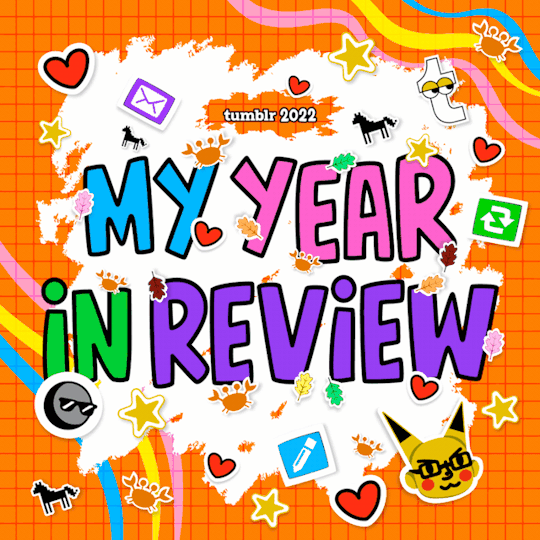
I posted 633 times in 2022
That's 579 more posts than 2021!
71 posts created (11%)
562 posts reblogged (89%)
Blogs I reblogged the most:
@spengnitzed
@bixiebeet
@egonspenglersweetie
@tacticalcinnamonroll
@jollyfanasties
I tagged 128 of my posts in 2022
#ghostbusters - 75 posts
#ghostbusters 1984 - 63 posts
#egon spengler - 54 posts
#harold ramis - 44 posts
#janine melnitz - 39 posts
#egon and janine - 29 posts
#egon x janine - 28 posts
#ghostbusters fanfiction - 23 posts
#janegon - 18 posts
#youtube - 14 posts
Longest Tag: 105 characters
#why would you include this ship breadcrumb if you didn’t want us to notice them low key being a couple???
My Top Posts in 2022:
#5
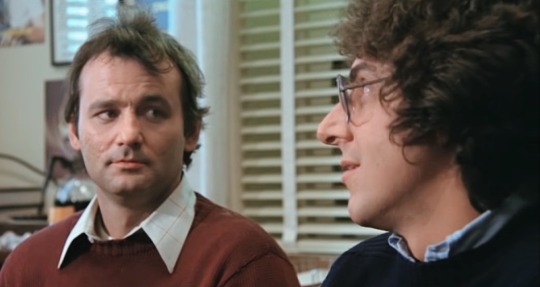
Peter was probably a class clown who latched onto the more serious Egon for academic help. In return, Peter taught Egon how to live a little bit—he grew his gorgeous curls out and gained experiences outside the classroom.
(Image from the movie Stripes.)
63 notes - Posted April 8, 2022
#4
Tldr: Janine and Egon have a beautiful and rare Jewish love story that was ahead of its time. Thank you fellow shippers for helping to celebrate this.
“Some artists argue that making light of prejudice, or turning purveyors of it into absurdities, robs hatred of power. I’ve been persuaded by that idea, and like many secular types, a Jewish sense of humor is more integral to my identity than any religious observance. It’s also a source of pride. A resilient comic sensibility that finds joy in dark places is one of the greatest Jewish legacies — as is an ability to laugh at ourselves.”
“When a gentile plays a Jew, the results are often more affected, the mannerisms pronounced, which can often mean the difference between someone playing Jewish vs. inhabiting a Jewish character…”
“I never questioned the idea that Jews had been well represented in popular culture until I read Jeremy Dauber’s book “Jewish Comedy: A Serious History” and learned that not one leading character on prime-time television clearly identified as Jewish from 1954 to 1972 and again from 1978 to 1987.”
“How much did it matter that as a boy I saw no Jewish couples on television? I’m not certain — draw your own conclusions about the fact that I married a non-Jew.”
This essay captures a key part of what I adore about the Egon-Janine ship: two Jewish characters getting a chance to be together. And mainstream people dig it!! Like the author, I was a Jewish child who hardly saw this depicted in TV and film.
I think many people don’t realize that Egon and Janine are Jewish, because they don’t look like caricatures of Jewish people that you often see in media. Especially caricatures delivered for laughs. This is the difference between ‘playing Jewish’ aka being over the top versus ‘inhabiting’ a Jewish role.
Janine’s surname, Melnitz, suggests an Ashkenazi (European) Jewish background. Many Polish, Russian, and other Slavic Jewish surnames end in “-itz.” (Think Manischewitz, Saffitz, Wolowitz, etc.) Janine is sassy fashionista, like a Brooklyn-born predecessor to Fran Drescher in The Nanny. Some online articles say that J. Michael Straczynski, a leading writer for The Real Ghostbusters series, even confirmed that Janine is Jewish.
Egon as played by Harold Ramis epitomizes a culturally Jewish character who isn’t acting like an exaggerated Jewish person. Ramis played A LOT of subtly Jewish roles, including: Moe Green in SCTV, Russell Ziskey in Stripes, Steven Buchner in Baby Boom, Harris Stone in Knocked Up, etc. He even played a Hasidic record producer who speaks Yiddish in the 2007 movie Walk Hard.
Ramis spoke at length in many interviews and speeches about how Jewish comedic traditions shaped his sense of humor. That worldview has more to do with depicting a Jewish character than what many people think it means to be Jewish (‘a very special episode’ when someone celebrates Hanukkah, which by the way is a minor holiday). According to Violet Ramis Stiel, her dad acknowledged the visual change from Egon in the ‘84 movie to The Real Ghostbusters like this: “I think we have a ways to go before we get a hunky Jewish cartoon character.”
Ramis and director Ivan Reitman were both Jewish. Reitman’s mother survived the Auschwitz concentration camp. They contributed a Jewish sensibility to Ghostbusters just as much as other actors and writers brought their own points of view.
All this to say, I rarely saw subtle Jewish characters like Egon and Janine growing up. And when they are on screen, they’re the quirky friend, not the hero or love interest. It’s meaningful to see how many people (especially non Jewish people) adore them as individuals and together. It really warms my heart. Thank you for reading!
72 notes - Posted February 23, 2022
#3
An interesting interview with Ernie Hudson from 2014. He talks about his disappointment with how Winston’s role was drastically cut in the first Ghostbusters movie compared to the original script. Winston’s backstory was removed and he doesn’t show up until pretty far into the movie.
Hudson doesn’t seem bitter, but he was understandably displeased. He mentioned that director Ivan Reitman said they wanted to give more screen time to Bill Murray. (Another article I read suggests that the Peter-Dana love angle came in as a way to give Murray more of a focus.)
Here’s my two cents: Murray, Harold Ramis, and Dan Aykroyd already had history together via TV, movies, and sketch comedy. Ramis said in interviews that he knew how to write in a way that captured Murray’s voice. I think diminishing Winston’s role was not a slight at Ernie Hudson, but instead reflected the writers maximizing Murray’s Peter Venkman. And yet…personally I think Venkman has aged the most poorly as a character.
I think a big factor that makes the Ghostbusters great is that they’re an ensemble. They all have their own strengths and weaknesses, but at the end of the day, their interpersonal dynamics make the movie so good. Winston is an integral part of that dynamic imho.
Winston is awesome and I hope we see more of him as the Ghostbusters franchise moves forward.
80 notes - Posted September 25, 2022
#2
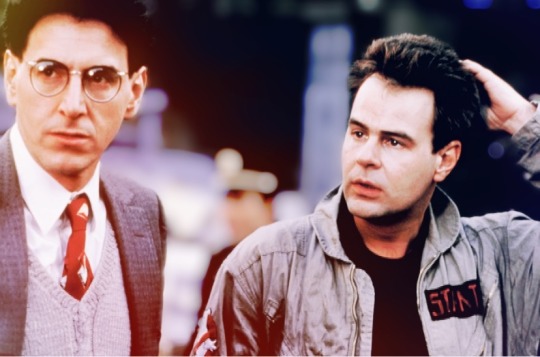
Lately I’ve been thinking about what happened in the Ghostbusters universe between films 1 and 2. Egon took up work in a lab and Ray had his occult book store. I imagine that they remained close friends. Ray was also doing kids’ birthday parties with Winston, so they all probably met up periodically.
In my head canon, Ray was the spoke that connected everyone. He was a sympathetic ear for Peter to discuss his romantic and professional woes. Ray probably kept in touch with Janine, too.
I could imagine Ray and Egon at the bookstore. Ray gets a phone call; he’s chipper about it. ‘Who was that?’ Egon asks. ‘Just Janine,’ Ray says. Egon tries to act disinterested, but he really wants to know how she’s doing…
109 notes - Posted May 11, 2022
My #1 post of 2022
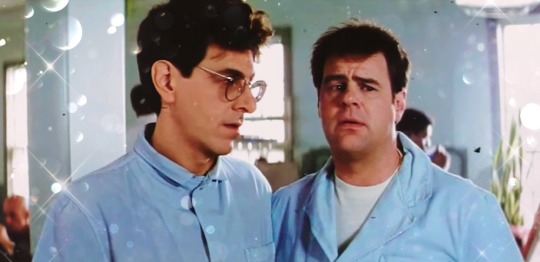
Egon and Ray were lifelong friends. You can’t tell me otherwise.
114 notes - Posted March 21, 2022
Get your Tumblr 2022 Year in Review →
5 notes
·
View notes
Text

Jude Hill’s Buddy and Ciarán Hinds’ Pop share a tender embrace in Focus Features’ Belfast. COURTESY OF ROB YOUNGSON/FOCUS FEATURES
Kenneth Branagh Breaks Down Scene From His Oscar-Nominated ‘Belfast’ Screenplay
The writer-director explains how a scene between Buddy (Jude Hill) and his grandfather Pop (Ciarán Hinds) shows characters from different generations on the brink of a major change.

COURTESY OF STUDIO
“The crux of this scene was to depict ‘cross-generational communication,’ ” according to Branagh. “Suddenly Buddy is having a deeper, more meaningful, more direct conversation about bigger things with someone a couple of generations away,” he says. Pop, unlike Buddy’s parents, is more willing to share a taboo story. “Pop essentially explains, in a charming way, a sort of admired system of extortion — an informal gangsterism to help people handle paying their rent. I’m sure my father would have thought this is not the thing to be sharing with his son, who he would expect to have a tiny bit more respect for so-called propriety.”

COURTESY OF STUDIO
Branagh says Buddy, too, is less guarded around Pop, and can freely talk about what is happening at home — his family’s possible move from Belfast to England.

COURTESY OF STUDIO
At just 9 years old, Buddy is faced with an existential crisis: having to leave behind the world he knows, as that world has become unsafe. “[Everything he knows] is under threat,” Branagh says, and going “across the water” to England terrifies him. It’s a symbolic phrase, Branagh adds, which alludes to the Irish who emigrated to America. “I felt later on [a nod to] crossing the River Styx — he’s waiting for a ferryman to take him over, one way or another. It’s a journey into adulthood.”

COURTESY OF STUDIO
Like much of Belfast‘s story, this was inspired by Branagh’s relationship to his grandparents. “I was often thrown into company with them, and they seemed to have a capacity for dropping some of the worries and concerns that parents had about appearances. They had more life experience, and they didn’t feel the pressure to be anything other than themselves.”

COURTESY OF STUDIO
Branagh wrote much of Belfast‘s dialogue with an Irish dialect in mind. “I wanted it to be something on the page to give a sense of authenticity,” he says, adding it was important to show “that it was possible to record in the dialogue the way people spoke, so it would begin the process of demystifying the accents.” He also hoped it would give an added sense of atmosphere and place for the script’s readers.
This story first appeared in the March 16 issue of The Hollywood Reporter magazine.
https://www.hollywoodreporter.com/movies/movie-features/kenneth-branagh-belfast-screenplay-1235111970/
Remember… (about his grandparents) I was often thrown into company with them, and they seemed to have a capacity for dropping some of the worries and concerns that parents had about appearances. They had more life experience, and they didn’t feel the pressure to be anything other than themselves. — Sir Kenneth Branagh
#Tait rhymes with hat#Good times#BelfastMovie#The Hollywood Reporter#22 March 2022#Belfast#Worldwide 2022
16 notes
·
View notes
Photo
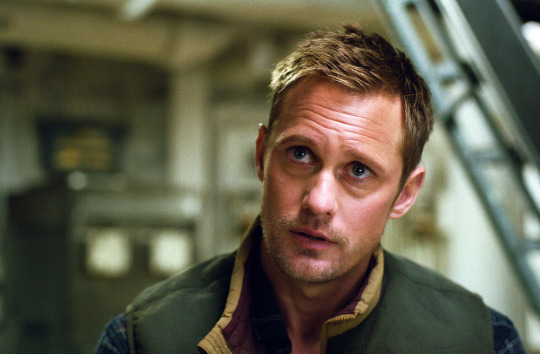
New Q&A with Alexander Skarsgård and Esquire Middle East
‘Alexander Skarsgård on pro wrestling, death metal, the joys of Godzilla vs Kong’ - by William Mullally, March 25, 2021
The Swedish star speaks to Esquire Middle East about his latest film, being home in Stockholm, and staying ripped for The Northman during quarantine
Alexander Skarsgård did not have the 2020 the rest of us did. There was no quiet quarantine, no tubs of ice cream devoured at three in the morning, no existential boredom, no staring out the window as we wondered if we’d ever be able to start doing things again.
No, Skarsgård had to spend the year staying in the best shape of his life to play an honest-to-god Viking warrior and Nordic prince Amleth in Robert Eggers’ upcoming epic The Northman. Not that he minded, of course.
Skarsgård is in a very good place. Before The Northman, he filmed Godzilla vs. Kong, which was one of the most joyful experiences of his career. It’s a film that is much better than anyone could have hoped, that fixes the flaws of the previous outings of the franchise in Kong: Skull Island and Godzilla: King of Monsters by making its supporting characters actually interesting to follow—including Skarsgård’s turn as a conspiracy-loving mad scientist named Nathan Lind—and making the battle between the legendary behemoths the stuff of Hulk Hogan vs. Andre the Giant.
Esquire Middle East caught up with the 44-year-old Swedish actor, who is aging like a vampire, fittingly enough, over Zoom ahead of the film’s release.
Read the full ESQ&A with Alexander Skarsgård below:
Alex, it’s great to see you again. How are you?
I’m pretty good. You’re in Dubai, right? I’m in Stockholm, Sweden at the moment.
How long have you been home?
I’ve been here for two months now since I wrapped The Northman.
How’s that been?
Yeah, it's been really nice. I mean, it's obviously a difficult time, but considering everything, I'm lucky, because everyone is doing alright. It's a nice opportunity for me, as I'm constantly on the road normally. It’s great to just be home, and not just for a week around Christmas or weekend over summer. I actually get to be here and spend some real time with my family.
You didn’t have any downtime in 2020?
Well, I was actually shooting for most of 2020. When the pandemic hit, I was in Belfast about to start filming the Northman, then we shut down for three months, and during that I had to train basically. It's a very physical role, so I had to keep working out. I was still in work mode for the whole lockdown. Then in July, we started shooting till the end of the year.
Did you prefer it that way?
I was very grateful to be able to work. It was definitely different from the normal set because we were completely isolated. We got tested three times a week and I basically lived in a bubble up in the hills of Northern Ireland and didn't see anyone didn't do anything for six months other than work and sleep and train.
I have a friend Adlai who lives in that village in Northern Ireland and I kept trying to get him to go break into your set because I needed to know more about this movie.
It was one of the most amazing experiences of my life. The most amazing experience.
You’ve been making a habit of working with great horror filmmakers, with Robert Eggers (The Witch) on the Northman, and Adam Wingard (You’re Next) on Godzilla vs. Kong.
What’s interesting about all these guys like Adam and Rob Eggers is they produce these really dark and twisted movies but they are two of the nicest human beings I've ever met. They're so sweet and genuine.
What do you and Adam like to talk about?
Death metal, probably. He's a big metal fan.
Are death metal people sweethearts, generally speaking?
Yeah, actually. Sometimes I feel like that's sometimes the case when you meet musicians in death metal bands they're like the sweetest, loveliest people who talk about their grandmothers and stuff.
Why do you think that is?
Maybe it's cathartic. It's a way to get out all that dark energy onto the big screen or as a musician onto an album.
Did you and Adam click immediately?
I met him years ago for another project. We didn’t end up working together on that but it was such a memorable meeting that we stayed in touch over the years. He’s not only a wonderful guy but so intelligent, such a film buff who knew everything about not only the horror genre, but even just films in general. When Godzilla vs Kong came up, I was just really excited to get an opportunity to work with him.
Were the words ‘Godzilla’ and ‘Kong’ enough for you, or did something specific draw you to this one?
I think it was a combination. I had just come off of a couple of really dark intense projects. I did the Little Drummer Girl, which is a limited series based on the John le Carré novel about conflicts in the Middle East, and I just come off Big Little Lies, two seasons of domestic abuse.
Did you just need something different?
It was just really two of the most rewarding experiences of my career but also really, really draining really intense experiences. I was just craving something fun and exciting. I hadn't done any big tent pole matinee-style movies and since Tarzan.
But you said it was a combination—are you also a Godzilla nerd?
Oh man, I was like a little boy. I just got giddy when I saw the renderings, the drawings, the storyboards, like the world that they wanted to create. I thought tonally they were the right people to make this kind of movie because I thought they had the balls to go all the way and make it as big and crazy and fun as it as I think it deserves to be, with the right amount of sarcasm and irony, but while still taking the topic seriously, and the characters seriously, and really caring about both Kong and Godzilla.
Did you and Adam share a lot creatively back and forth?
Oh, yeah. He would run up to me and ask what if they run into a creature that almost looks like an owl and start explaining how it works. And then you start sketching something on a piece of tissue. And then a week later, he would come back with something amazing that the visual artists have created. To be part of that from an early stage is so exciting to me.
As a pro wrestling fan, that balance of ironic and serious you mentioned sounds awfully familiar to me. Did you guys make a pro wrestling movie on purpose?
It’s a lot like pro wrestling. Like, you want the fights to be big spectacular, fun, and entertaining. But you want to care about the wrestlers, right? You want to root for them. I think Adam did such a great job in finding that tone. They beat the sh*t out of each other on an aircraft carrier, but you also want to connect with these creatures and care about them. The movie asks, what does Kong really wants other than beat up Godzilla? What is he longing for in life?
That’s exactly what I think when I watch the Undertaker throw Mankind off Hell in a Cell.
Absolutely!
Godzilla vs. Kong is in theaters now across the Middle East
https://www.esquireme.com/content/51448-alexander-skarsgard-on-pro-wrestling-death-metal-the-joys-of-godzilla-vs-kong-the-northman-interview
Photo from WarnerBros. Entertainment. Thanks to SophTop on Delish for the find!
67 notes
·
View notes
Note
do you have shounen recs too? other than naruto and fma lol
naruto and fma are like decade long infections that have refused to leave me djdbkdn but yes, i do! i’ll apply the same logic here as i did in the other post where i include some seinen too bc ultimately the distinction is just an age demographic
sket dance (manga) - this is one of my favorite manga of all time! it centers on a group of three friends—bossun, himeko, and switch—who start a student support group at their high school for anyone to come to with their everyday problems. the clientele and their problems are varied in a pretty humorous way, and in the beginning it almost feels like the series is set up to be purely comedic, but as you get further into the series you learn just why the main characters started the club, which is the winning point for me. these characters are so fleshed out and so much of their individual trauma gives insight as to why they’re intent to help and befriend others, especially on bossun’s part. he is probably one of my favorite shounen protagonists period. his character propagates a really wonderful message of how people don’t need to be fixed in order to solve their problems, just listened to and supported, and i adore the series for its exploration of that concept. the mangaka was also an assistant to sorachi on gintama, so i think fans of gintama will rly enjoy it in the sense that both series share similar values, messages, and humor! there’s a few crossovers between the two, iirc. also! i don’t particularly mind the anime and it has a banger soundtrack but just imo the emotional beats hit harder in the manga
silver spoon (anime/manga) - this is the series hiromu arakawa wrote after finishing fma, and i would actually argue that it’s her better work of the two! it centers on a boy named hachiken, who spontaneously decides to enroll at an agricultural high school to get away from his stressful family life in the city, and obviously, it’s a huge reality check for him. he’s dropped into this school where every other student has farming-related ambitions in the long run, while he has no ambitions at all and simply used enrollment as an excuse to get away from his problems. the series is a masterclass in learning about the worth in hard work, camaraderie, and why thinking about your future and what you want to do matters, not just from a practical aspect but also in terms of self fulfillment. as expected of arakawa, it boasts endearing humor, a wonderful array of distinct characters, and a really fleshed out portrayal of farm life, made even more enjoyable and genuine by the fact that she’s writing in her element, as she grew up on a farm herself
tsubasa reservoir chronicle (manga) - this is a cult classic within clamp circles, but outside of that fandom it’s more known as the intimidating clamp series most ppl wouldn’t touch with a ten-foot pole. and i get that! the fact that it crosses over with some other clamp series makes it pretty confusing to parse through at times. but i also think that’s the series’ greatest strength, bc when you understand the nature of that crossover, the depth of the storytelling is truly brilliant! at its most basic, trc follows a pair of childhood friends, syaoran and sakura, who live in a desert-like “clow country”. sakura walks into some ruins one day and is spontaneously robbed of all of her memories, which syaoran must then journey across multiple dimensions to recapture, as her memories have been scattered in the form of feathers. the pair also have three traveling companions—kurogane, fai, and mokona—and altogether the group visits multiple dimensions that are loosely inspired by clamp’s other series and characters. obv, as the plot progresses, we discover there’s more to the group’s mission than meets the eye, and it ventures into pretty dark, existential territory, as is the norm for clamp. it also may be unpopular of me to say this, but i actually think it’s a great introduction to clamp (it was mine lol), given there’s so many cameos from their previous series and the series sets up such interesting lore. just be warned that you do have to think while reading this series, as the lore is intense! also, do not watch the anime. at all. it’s the worst adaptation ever
ookiku furikabutte (anime/manga) - popularly called oofuri, this series is in my opinion one of the best sports manga published in the last two decades. it follows a boy named mihashi, a baseball pitcher who refuses to give up the mound and essentially alienates himself from his middle school teammates in the process bc they don’t know how to actually utilize his pitches. he enters high school as a total nervous wreck with little to no confidence in himself bc of this experience, until the catcher, abe, recognizes that he’s actually a really unique pitcher unrecognized for his talents by his old teammates. abe and mihashi basically latch onto each other, with abe believing he can mold mihashi into the best pitcher there is, and mihashi believing abe is the one person capable of making him into a good pitcher. it’s a fascinating take on codependency and building up your self esteem, and i would argue that higuchi asa’s sports psychology background lends itself splendidly to the messages oofuri sends about how to build healthy sportsmanship among teenage boys. overall i think it’s a great series to read if you’re looking for catharsis and comfort, as well as baseball lore!
gangsta. (manga) - this series is the most dark and complicated of the works in this list, just as an advisory. there’s prostitution, gang violence, gore, etc etc. but for the presence of all of that, gangsta. is probably one of the most well rounded series i have read in the last few years. it starts with alex benedetto, a prostitute who ends up as the sole survivor of a mass gang murder propagated by two thugs for hire, worick and nic. the two men take her under their wing as a friend and someone who answers their phone, and the three of them form a unique but really loving partnership with each other. the plot eventually extends into a turf war that plagues the town they live in, ergastulum, on account of a drug trade that allows for the breeding of “twilights”, who are essentially drug enhanced superhumans. it’s hard to explain much more without giving away spoilers, but the series has an incredibly diverse cast, in terms of race, disability, and sexuality, and it manages to tackle really dark subject matter without coming off as too edgy or tragedy porn-seque. the artwork is also absolutely gorgeous and the relationships among various characters are portrayed with such amazing nuance, that i can’t even complain when plot points make me sad beyond belief
this is what i have for now but i may add onto it later! do let me know if you enjoy any of these ❤️
#sket dance#gin no saji#tsubasa reservoir chronicle#oofuri#gangsta.#these are fun to do! i also feel like i rambled so much more here omg#mine:recs
22 notes
·
View notes
Text
Watched a playthrough of FF6 recently.
I guess between all the bouts of grinding and level exploring I never realized just how melancholy that game is in tone when you focus on the main story from A to Z.
It’s not depressing, but goodness gracious. Most of the character development is tragic.
Like, Terra. What is she? She’s introduced as the captive mind-slave and personality robbed war machine for an actual evil empire. She’s the bi-racial spawn of fairies and humans (Fight me on that term. I dare you. I dare you, fucker. Fight me on my classification of her father’s race as fey.) that was an unwitting attack dog. Upon heading to a neutral arctic country, she meets a frozen fey-dragon entombed in ice. Trying to interface with her causes her machine to explode and brings her into the care of a man in town that opposes the empire. He frees her mind. Now this poor little half-fairy faun has to cope with the existential terror of suddenly being a person instead of a CPU for war machine.
So she makes friends with a world traveling treasure hunter, meets a dashing young engineer and prince of a techno-kingdom, his brother the weightlifting kung-fu dude, and joins an anti-empire resistance movement, knowing just the weight of what’d happen if that empire gained control of all the fairy-magic.
Well not too long after she defends Narshe from another Imperial attack and attempt to seize the entombed fairy-dragon. Again, she interfaces with the fairy-dragon. This time, the fairy-dragon awakens the other half of her heritage.
Terra sees her own transformed body and flies into a complete dysphoric tantrum where she flies off trying to escape from her own body, burning through the sky and screaming like a pink furred, yellow eyed demon. She burns parts of entire towns just buzzing them gibbering for human contact and help and all anybody sees with her whizzing by is a screaming monster before their houses and shops catch fire or are blown apart.
The party locate her in the top room of the tallest building in a city full of liars, thieves and degenerates, but she’s bedridden. Any time she wakes up she freaks out and knocks herself out or passes out at the reality of her own transformed state. They don’t know exactly how to help her. Then another fey person appears and lays it down; she’s not human. She’s not just some garden variety experiment from the Empire to endow human beings with magic. She’s full on, real deal, offspring of a Fair Folk and a human woman that strayed too close to the Other Side. The man reveals he escaped from the Empire’s torturous mechanical fortress where they suck the magic right out of the fairy-people and reduce them to immobile, pathetic lumps of the creatures they used to be. And also that they turn into magic crystals when they pass away. Where he proceeds to just.. let himself die for the party’s benefit. They receive their first Summons and ways to learn magic from the crystals.
His only request is they find their way to the Empire’s magitek facility, free the fairy-folk, and shut the abominable site down.
Well, after a detour to get an airship, they do so. They find a whole bunch of fey-folk in glass tubes being drained of life. Among them, Terra’s father. Maduin. But it’s too late. The Fey-Folk explain that their lives have been drained too much- there’s nothing left to save. They gift their remains to the party to help stop the Empire and become magicite/materia.
Only when you bring back the still psychoactive remains of Terra’s father, let him interface with Terra, let him show her her origins from HIS perspective, how he met her mother, how they formed a relationship in the fey-world, show him how the Emperor and the Empire invaded the magic realm, does Terra stop seeing her existence as monstrous and relax back into her human state. Now able to transform.
After you confront the Empire and fail, causing the world to go through a reshaping apocalypse as the bad guy co-opts the god statues, your party is scattered throughout the remade world.
Terra has taken up residence in a town that was devestated by Kefka’s godlike Light of Judgement- basically a laser beam that sundered the world. Where most of the adults perished protecting the children from horrible monsters and fiends unleashed from the broken world. They call he mama, now. She’s taking care of dozens of orphans in a town ravaged by destruction.
But by the time you find her again, she’s lost her will to fight. In trying to defend the town from an ancient monster, Phunbaba. She gets beaten near to death. So, the party rescues her. It looks like Terra is never going to rejoin your party and help save the world. She has to mother hen these lost orphans.
You come back later and fight Phunbaba again. Terra emerges and goes Super Fairy Saiyan and joins your party to fight him. After defeating him, she stands there in the town, monster-up. The children approach her and recognize her as Terra- whom they just call, ‘mama.’
She explains that she loves them, but has to leave them to join the party and help save the world from monsters like that. But she’d be back for them. Rather than be afraid of the Burning Pink Monster, they praise her and wish her well on her adventure and hope she returns home before the 17-18 year old couple have their first baby.
Moving on, they finally meet Kefka in his tower. Which he has dubbed, his monument to non-existence. Kefka doesn’t want to do anything but end life itself or make it suffer. That’s his whole bag. He finds amusement and joy in the suffering and oblivion of other people. Final fight ensues. They win.
But the tower starts falling apart. They have to escape. While fleeing, the fey-crystals start disappearing- without the goddess statues and Kefka grounding the two different worlds, the feywild and the material world, the two are separating again. Maduin contacts his daughter again and tells her she is of two worlds; there’s a risk that she may be drawn into the fey-world with them, or simply ripped apart from the genes out. Unless she has a strong attachment to this world and the people in it, then she might... MIGHT..... have a chance to survive and live in that world. If she believes hard enough.
Terra transforms again into her flying pink furry monster mode and guides the airship out of the collapsing heap of a tower/castle as it comes down, as magic starts to fade from the world. Like a big monstrous Rudolph the Red Nosed Reindeer.
She starts to fade out. Losing her magic. She reverts, and the airship catches up, where she lands on the deck in a heap. Checking to make sure she’s still alive, she’s just barely. But she’s alive. Her Fey-side forever shut off, however.
She went from personality robbed, shell of a person, to confused purposeless soul screaming into the ether not knowing where she came from or what her purpose was, to understanding who she was and where she came from, to making contact with humanity around her, to eventually saving it and attaching herself to the planet and its people strong enough to escape death and save her friends.
There’s no saving the people that died when the world went to shit, there’s only rebuilding and moving on. But, she did it.
Terra’s story is probably the longest in the game, but they’re all basically similar.
The biggest problem is if someone tried to make this game into a movie, probably the whiplash of the major plot points would just be a cryfest.
4 notes
·
View notes
Photo

Truffle Hunter.
As Pig snuffles its way up Letterboxd’s best of 2021 ranks, Mitchell Beaupre hunts down writer-director Michael Sarnoski for a chat about some of the finer creative points of his Nicolas Cage-starring meditation on cookery and grief.
In a time when audiences know too many specific plot details of films months before they’re even released, the idea of a surprise sensation feels like a fleeting memory. Yet that’s exactly how one could describe Pig, the debut feature from director Michael Sarnoski. With minimal pre-release buzz and no flashy festival premiere, Pig is a film whose status has been created through sheer quality alone.
This is a true word-of-mouth smash, hailed by critics as one of the best films of the year, as well as quickly earning itself a high placement on our Top 50 of 2021. Jacob Knight praises the film as “an existential rumination regarding how people find meaning in a mostly meaningless world”, while Muriel declares it “the most unexpectedly wholesome movie I’ve seen in forever”. Not bad for a first feature.
Written by Sarnoski, from a story he developed with co-producer Vanessa Block, Pig opens on Rob (Nicolas Cage), a loner isolated in the woods with his truffle pig. Rob makes his living selling truffles to the eager and ambitious Amir (Alex Wolff), but when two people break into Rob’s home and steal his animal companion, he must do whatever it takes to be reunited with his only friend.

A rough day deserves a decent vin rouge.
While that setup led many to give Sarnoski’s film the moniker “John Wick with a pig” when the trailer dropped, the story ends up charting a course away from genre thrills and towards something else entirely. Pig is an exploration of grief, loneliness and compassion, featuring one of the finest performances of Nicolas Cage’s illustrious career.
Raised in Milwaukee, Sarnoski and co-producer Block met in college before working together on the documentary short The Testimony, which focused on the largest rape tribunal in the history of the Democratic Republic of the Congo. That film made it onto the shortlist for the 2016 Oscars, putting the two of them on a path that would lead to their breakthrough opportunity with Pig.
Sarnoski spoke with us about the origins of Pig, the long-term impacts of loss in his own life, the joy of hand-cranked pasta and Bruce Springsteen.
Congratulations on the film! How has it felt seeing this outpouring of love coming for your first feature? Michael Sarnoski: It’s been amazing. Everyone who made this movie felt for themselves that it was special, and we all put a lot of care into it. We also knew that it was a risk, a strange film we figured would hit right for some people, but then plenty of others would think it was boring and weird. We’ve been very pleasantly surprised that it’s a small minority of people who feel that way.
What was the seed of the story that would eventually sprout to become Pig? I had this image in my head of an old man in the woods with his truffle pig. There was something sweet and tragic about that. Then I began asking questions about who this guy is and why he’s out there alone in the woods. What’s his backstory? It all evolved from there.
While the first act inhabits that “John Wick with a pig” space that people were perhaps expecting from the trailer, the story then takes a swerve and becomes a somber, thoughtful character study. Could you speak about navigating that unique arc with your storytelling? We never set out to try and subvert that John Wick sort of genre. We knew that we were playing with that lone-cowboy idea of a film and some of those tropes, but we never wanted to poke fun at that or switch people’s expectations in some sense by choosing Nic to star. We never wanted to “surprise” people by making a quiet Nic Cage movie. It was always just about these characters, what this story is, what we’re trying to explore. I think if we had tried to be subversive it would have come off as hokey.
Silence plays a key part in the film, as so much is being said in those spaces between the dialogue and action. How did you want to utilize the impact of saying more with silence? From early on, we always knew it was going to be a very silent film, and that followed all the way through the edit. Some of us wanted that opening to start out the way it’s done in the movie, where it’s totally silent and the music only comes in at the very end, while others were worried that people would get bored with it. The argument against that was that if they’re going to get bored with that, then they’re going to get bored with the rest of the movie. So, we might as well just lean into it, and let them know what it’s going to be.
From there we gauged how we wanted to approach the silence throughout. There’s some beautiful music in the film that Alexis Grapsas and Philip Klein did an incredible job with that allowed us to bring this beauty and splendor into the scenes. But there were also a lot of really quiet moments where we wanted the audience to be focused on the faces of the characters, and really be feeling the space and letting the sounds of the forest, or wherever we were, come across.
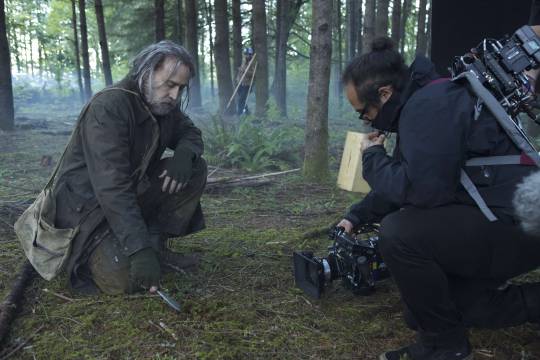
Nicolas Cage, his knife skills, and cinematographer Patrick Scola.
Along with the faces, you focus a lot on hands in the film. Whether it’s in scenes of violence or making food, there’s a real emphasis on what hands are capable of. Where did the inspiration for that come from? Nic was very into the idea of conveying artistry through your hands. He spent a lot of time with local chefs to try and get the vibe of how they moved and how they worked. He was always practicing knife skills in his room. I was constantly waiting for the AD to come up and tell me that we can’t use Nic today because he cut off a finger, but thankfully that never happened. Nic really sold that emphasis on the hands. Those shots could have felt empty if it wasn’t for him. I still am surprised watching some of the little hand choices he made.
I remember there was one shot where we didn’t get it on the day. So, we set it up with his stand-in, and just had him wearing his gloves. We all watched it, and it just wasn’t the same. Nic agreed, and so we reset the entire thing just to get that one shot with his hands in there instead. It was totally worth it. He’s an incredible actor, and it comes through every part of him.
Cage is an actor with an almost otherworldly mythos about him, which allows people to sometimes forget what a tremendous performer he’s always been. What was your experience in building a relationship with him, not just as an actor, but also as a human being? I only have positive things to say. That’s not just a gimmick. From the moment he read the script, he was interested, and he really responded to the character. He was committed to bringing the script to life, and was extremely respectful towards everyone on set. He had no reason to respect me. I’m a first-time director. He could have been a total diva. He could have been whatever he wanted to be, and we still would have paid him and been happy with his performance.
He was very kind, and maybe some of this came from the character, but he was also kind of somber and quiet in general on set. At the same time, he can also be very playful and sweet, even though he was trying to remain in the mood of the character. He set the tone, in a way, for the whole crew. A crew could easily look at a first time director and decide to just slack off and scrape by, because I wouldn’t have even known the difference. The fact that Nic treated me and the material with such respect really trickled down, and was so valuable to the film.
We shot the whole thing in twenty days, so if there had been any weak link with someone not doing their job or not being totally on top of it, we would have been screwed. I credit a lot of that to Nic, and him treating this with an incredible amount of professionalism. I think that’s where a big part of his long career comes from. He’s an incredible actor, but he also takes the art form seriously, treating it as both an artist and as this being his job, knowing that you have to do both in order to get what you need across.
Do you have a favorite Nicolas Cage performance? Other than Pig, of course. There are so many incredible ones. I really love Moonstruck. I saw that a couple of years ago, right before we officially cast him, when I was going through some of his ones that I hadn’t seen. Part of it I think is because I’m half-Italian, and I felt like it was showing me a side of my life that I never realized because my Italian family is on the east coast, and we moved out to Wisconsin when I was very young. I never got to be a part of that kind of thick Italian family, and seeing that on screen gave me a taste of what that would have been like. I loved him in that role. He was the perfect balance of sincere and sentimental, and also over the top when he needed to be.
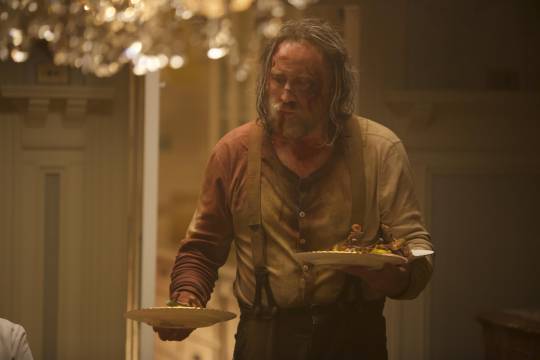
Grub’s up.
Speaking of being Italian, Pig gets deep into the transformative power of food, and of the right meal. Has food always been an important part of your life? Definitely. I’ve never worked in restaurants. The closest thing was when I worked at a snack bar at a summer camp, which was very fun and also kind of a nightmare in its own way. I think most of the importance of food for me came from when my grandma lived with us. It was after my dad passed away, when I was a little kid, and she became this sort of old Italian cook in the house who was using food as this language of love and also as a sort of control. It had a lot wrapped up in it, this sense that we’re going to have family dinners to prove that everything is fine.
I think any Italian family is that way, but especially in that situation, having that presence come into the house when I was a kid, it made food quite charged for me. It was both a form of bonding and love, but also that control. That was very important to me. As I got older she taught me how to cook some things, and I became interested in that. I had a lot of friends who were great cooks and taught me how to do different things. I’m not an amazing cook, but I love cooking.
I love that act of making something that’s about to disappear. I think if you can be okay with that, and put a lot of time and care into that, it’s kind of a therapeutic thing to do. Accepting transience is a big part of cooking.
What’s your favorite dish to cook? I would say over the pandemic I really got into making lasagne. I had my grandma’s old hand-crank pasta maker, so I was enjoying making my own pasta and lasagne with that. I don’t know if I could pick one favorite dish, but that is definitely one that contributed quite a bit to putting on the Covid pounds.
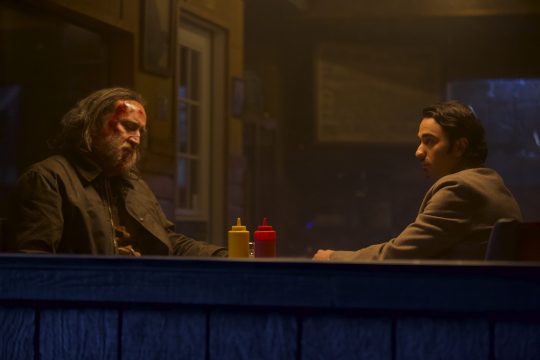
Rob (Cage) and Amir (Alex Wolff) discuss their business relationship.
There’s a scene in the film where Rob and Amir go to a restaurant and Rob has a conversation with the chef there, who used to work for him, about the idea of losing our sense of identity when we give up on our dreams in order to fill this role that society expects of us. Is that something that you personally connected with? Yeah, people ask me a lot about what I think of the high-end cuisine world, and I have to say that I wasn’t trying to solely express that this world is garbage and phony. I was looking at it as another kind of art form. Any time you have an art form that combines someone’s personal passion with some sort of economy there are going to be conflicts to navigate. Whether you’re a painter, director, writer, whatever, those are going to be things you have to juggle. How true to yourself are you going to stay?
For myself, I’ve definitely found that when I try to focus on doing something that I care about, that’s kind of all I have control over and that’s what I should focus on. Pig was that for me. This isn’t the kind of script that you write where you’re expecting a big payday. It’s this weird movie that for some reason really means something to me.
The scene climaxes with Rob saying the line, “We don’t get a lot of things to really care about”. What about this movie exemplifies the things that you really care about in your life? It’s so many things, and even more things came from going through the process of actually making it and falling in love with Portland. It’s become even more than what it was initially intended to be. I mentioned earlier that my dad passed away when I was a kid, and the most personal aspect of the film for me was exploring that idea of what grief does to us long-term.
As I’ve gotten older I’ve been watching how my family members changed the way they interact with the world and built their perception of the world around some aspect of grief. It’s not those immediate effects of shock or sadness. It’s how those things ingrain into your worldview. I became much more conscious of how I was doing that in my own life. That was the deepest, most general thing that I was bringing to it, and that I was exploring personally through the film.
As far as specific things that I care about, I think I have all the classic things. I care about my family, and my friends. I care about the world, which is why this year has been so devastating. I don’t have one single pig. I think we all have a few different pigs in our lives.

Director Michael Sarnoski on the set of ‘Pig’.
Another scene that really stands out is the one in which Rob returns to his old home and sits with this young boy, having a conversation about a persimmon tree that used to be there. Talk to me about the significance of that moment for Rob. One of the things I love about that scene is that it seems so simple, kind of quiet and basic, but it’s getting into a lot of different things. I will say one thing about that scene. That was the first scene that we shot on the first day of filming. That kid was great, but filming with a child on your first day of your first feature was very much a moment of wondering what I had gotten myself into.
That scene does a few things. I won’t get into spoiler territory, but for starters he’s going back to his old house, so it’s his first attempt to really look at his past in the face, and to acknowledge that. I like that in that moment this is also one of the first times that we hear him speak romantically of food, because those things are very tethered to each other.
We get both the sense that there was a past, a personal path that he left behind, but intricately involved in that was how he interacted with food and his art. It’s the first time that we hear him acknowledge who he was in a way that’s okay. He tells the kid his name, and he’s acknowledging his identity that he’s been trying to hide from or ignore. Through doing that, it’s engaging with his passions and how that tethers everything together. I also thought it was cute explaining what persimmons were to a little kid.
I’ve got to ask you about the use of Bruce Springsteen’s ‘I’m On Fire’ in a very meaningful moment. What made that the perfect song choice for that scene? Obviously, who’s singing it is very meaningful. I liked that song, though, because it’s different from the sappy direction we could have gone with that moment. There’s something very passionate about ‘I’m On Fire’, of course, and it’s a pretty sexual song. It’s really charged, but it also has this kind of ethereal quality to it that’s seductive in a non-sexual way. It washes over you, and it feels very mystical. This sounds so “film talk”-y, but I liked that meeting of that transcendent, abstract feeling with that immediate sense of passion and love and obsession.
Finally, what’s the film that made you want to become a filmmaker? Probably Sam Raimi, his first Spider-Man movie. That was the first time I realized what directors do. I had a very strong association with Spider-Man growing up as a comic-book fan, and I was seeing how someone was filtering their own understanding of this character. Raimi coming from his horror background and being into the nitty gritty filmmaking with practical effects and everything, I got this understanding of how a director touches a film and shapes it.
Related content
Steve’s list of pigs in film
Melissa’s list of films featuring food, chefs, bakers, restaurants, cooking, hospitality, hotels, wineries, grocers
Rachel West discovers Nicolas Cage is her most-watched actor of all time
Letterboxd’s Official Top 50 of 2021—Jack Moulton’s list
Follow Mitchell on Letterboxd
‘Pig’ is currently in US cinemas via NEON, and available to buy/rent on digital.
#nicolas cage#pig#pig film#neon#neonrated#neon rated#nic cage#cooking films#cookery film#films about chefs#truffles#truffle pig#truffle hunter#letterboxd#filmmaker
1 note
·
View note
Text
Star Wars: The Clone Wars “The Phantom Apprentice” -Review
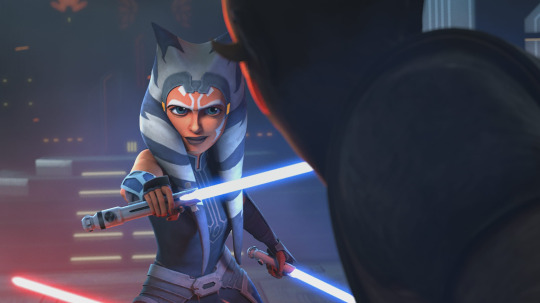
The Clone Wars creates a horror movie of inescapable dread in the game changing, “The Phantom Apprentice”
(Review contains episode spoilers)
youtube
Maul and Ahsoka Tano are now face to face. As the battle for the future of Mandalore unfolds around them, it becomes clear that something much larger is at stake. The fate of the galaxy hangs in the balance and everything that is known will change. And our heroes and villains are powerless to stop it.
It’s been known for quite a while that the end of The Clone Wars would tie into the events of Revenge of the Sith. The show has been on a collision course with this darkest installment in the Star Wars saga ever since it premiered in 2008 and now the inevitable moment has arrived. Everything in the galaxy is about to upend itself and the feeling of dread and tragedy hangs over everything. While The Clone Wars has dipped its feet into the horror genre before, director Nathaniel Villanueva and writer Dave Filoni have created a half hour experience of impending dread and terror.
The Clone Wars was always going to end in heartbreak. Revenge of the Sith was the inescapable end point for this series, but the unspoken cruelty of this series is in the unaware insignificance of its own cast. Ahsoka Tano, Rex, Maul, the Mandalorians are doomed to be side notes in the galaxy altering Skywalker Saga. Their narratives are twisting, emotional, and undeniably engaging but they will never escape living in the margins of the adventures of the mythic figures they count as their friends, allies, and enemies. There is a knowing futility to Filoni’s script for “The Phantom Apprentice” that pervades everything. We can be watching titanic battles unfold on the streets of Sundari and daring lightsaber duels, but it’s all for nothing. Composer Kevin Kiner, still the only musical talent that has come close to mirroring and expanding off the legendary work of John Williams, turns the aural landscape of this conflict into a sound that can only be described as Star Wars meets Hereditary. We are never once made to feel comfortable. There are no hints that this will work out. It won’t.
Like the standout season finale to Star Wars Rebels’ second season, the title of “The Phantom Apprentice” is deceptively nuanced. It’s actually in conversation with three different characters, one of whom never actually appears on screen.
The most obvious of the three is of course Maul, the original apprentice to The Phantom Menace. I’ve never hidden my adoration for the long, strange character arc that Lucasfilm Animation has taken this formerly one note villain on. Sam Witwer, Dave Filoni, and the rest of the creative team have transformed this former Sith assassin into a perpetually broken and emotional frail man that is never more than a few steps away from collapse. First hinted at in one of his first appearances on this series, Maul was always aware to some degree of The Clone Wars and the larger machinations of his master. The pieces were always in place and now Maul is slowly realizing that the end goal of his master’s decades long plan is finally upon them. And it terrifies him. Long gone is the confident Maul who thought he could carve out an Empire for himself in the shadows of the galactic underworld. After Darth Sidious’s humiliating beatdown of him in “The Lawless” and the murder of his mother in the Son of Dathomir comic series, it’s now clear to this lost Zabrak that his master is the most powerful being in the galaxy and something to be feared above all else. Witwer plays Maul’s former anger and jealousy at having his dreams of grandeur robbed of him as a transformation into existential collapse. He realizes that he really is nothing more than a cast aside bit player in the revolution that is about to come and he is determined to stop it from happening. Not out of any kind of good will or redemption, but out of his own desperation for survival and relevance.
I’ve always been a tad skeptical of one of the final confrontations of the series being a duel between Asoka Tano and Maul. Not at all because Ahsoka isn’t capable of taking on a character like this wayward former Sith. She’s more than proven herself able and “The Phantom Apprentice” more than sells that Maul is definitely not acting at full capacity. (We’ll talk more about that fantastic confrontation later along with the rest of the stellar action here.) Instead, I was concerned that this clash would feel hollow. Ahsoka and Maul do not have an existing relationship prior to “The Phantom Apprentice.” Their big climactic meeting of sabers could have been nothing more than a set piece that was created only because they were the only characters free during the Revenge of the Sith era to have one. That is very thankfully not the case.
Filoni smartly positions Maul and Ahsoka as two sides of the same coin. As Maul was eventually cast out and discarded as useless by Darth Sidious, Ahsoka was also tossed away by the Jedi order by their own dedication to doctrine and lack of trust. Both are victims of their respective order’s worst qualities and exist as relative outcasts. However, the true dramatic irony of it all is that by doing so, both Ahsoka and Maul are arguably in better positions to survive the coming slaughter and possibly put an end to it. Sure, Maul’s argument for their teaming up to stop Sidious is mostly self-serving (even if I suspect that it does have some root in the sad sack of a Sith’s perpetual need for companionship and belonging), but Ahsoka considers it for a moment because she can see the truth in it all. It’s a fascinating moment and the fact that it feels emotionally genuine is a true feat of Ahsley Eckstein, Witwer, and the entire creative team. We can’t not acknowledge that incredible shot of the shattered glass and embers blowing through the wind as Maul’s fateful offer is made.
The final apprentice is of course Anakin Skywalker. Perhaps the most startling development of “The Phantom Apprentice” is Maul’s revelation that he is more than aware of Anakin’s eventual slip to the Dark Side and it was probably in the cards for quite some time. (His moment of post-mortem pity for Dooku is a fun wink to how doomed all of Sidious’s apprentices were on their eventual march toward Anakin’s ascension.) It recontexualizes so much of the final days of The Clone Wars and of Sidious’s plan itself. Of course as Anakin’s fateful seduction to the Dark Side is occurring parallel to the events of the Siege of Mandalore it is more than fitting that Maul is not the only one with Anakin on his mind. The brief call between Obi-Wan and Ahsoka comes from a place of compassion, but it ultimately serves as further example of Ahsoka’s suspicion of the Jedi. She sees a kindred spirit in Anakin at the moment that the Council betrays his trust and how could she not. The fact that Ahsoka and Maul’s duel happens mostly as a retaliation to the assertion that Anakin will fall speaks to her unbreakable trust in her surrogate older brother. It ends up playing as a bit of a fight for Anakin’s soul. Hope versus despair and denial versus inevitability.
And what a battle it is. Dave Filoni mentioned at Star Wars Celebration last year that they brought in original Darth Maul stunt actor Ray Park to assist with the animation for this fight and it certainly shows. While it may not be the most sprawling duel ever or as brutal as Pre Vizsla and Maul’s duel to the death, The Clone Wars has never featured a confrontation as fluid and dynamic as this one. The constant back and forth of the upper hand and the emotional instability of both fighters gives this encounter a strange edge that ratchets up the tension even if we know both combatants are destined to make it out of this alive. The final stage in the scaffolding that holds up the city of Sundari is a standout and brings to mind a similarly stellar set piece from Mission Impossible: Rogue Nation.
It’s not just our phantom apprentices that get in on the action this week. A claustrophobic showdown between Bo-Katan and Gar Saxon in an elevator shaft is one of the most inventive set pieces that the series has produced and Villanueva sells it with a cluttered intensity that never loses clarity. A prolonged battle between the liberating forces and Maul’s loyalists is similarly brutal and striking with sweeping tracking shots of the action that smartly know when to cut into the carnage and when to transfer back to other scenes. It brings to mind some of the great multi-tiered battles in Star Wars history and it once again gives big screen live action installments of the franchise a serious run for their money.
A few random final thoughts!
It seems only fitting that Almec would be gunned down by one of his own allies. Gar Saxon is poised to take over Almec’s position as the self-serving Mandalorian leader in the era of the Empire and there’s certainly some poetry in this sort of cyclical killing. Poor Mandalore. Planet’s not going to sort itself out anytime soon.
Jesse lived! I’m sure every one of us clone junkies were prepared for one of our last surviving 501st boys to fall to Maul this week, but through some small glimmer of positivity the newly minted ARC Trooper survived. I’m not sure we can be as hopeful in coming episodes, but I’ll take the positivity where I can find it.
I actually really loved Maul’s cameo in Solo: A Star Wars Story and it’s nice to see “The Phantom Apprentice” tee that up with the blink and you’ll miss appearance by Dryden Vos. Was really hoping for a tiny line of dialogue from Paul Bettany, but I guess that’s as good as we’ll get for right now.
Sam Witwer remarked several months ago that the scripts for the final arc of The Clone Wars were the best the series ever produced and it’s hard to argue with that. Never before has this saga had more on its mind or felt as emotional or consequential. It’s a nail biting stunner of a chapter and I’m genuinely in awe that we are only half way done. Buckle in folks. This is when the pain really begins.
Score: A+
#Star Wars#The Clone Wars#Clone Wars#Star Wars: The Clone Wars#review#reviews#The Siege of Mandalore#Ahsoka Tano#Maul#Dave Filoni
54 notes
·
View notes
Text
My Top 10 Favourite Horror Films of 2020
Every January, most people who review or talk about movies on YouTube tend to piece together a Top 10 list of their favourite movies from the year prior. In order to stand out from the crowd (and also because I was too lazy to do this sooner), I decided to wait until March, by which time most YouTubers aren’t really talking about movies from 2020 anymore.
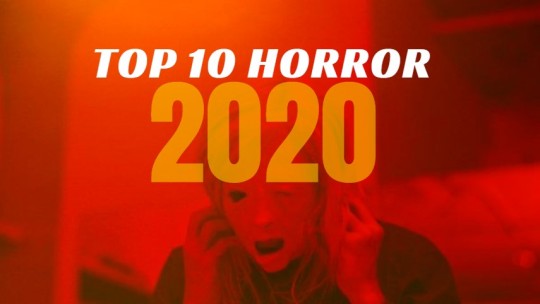
I know what you’re thinking: sounds kinda stupid – why would anybody care about a Top 10 list of the best movies of 2020…THREE months into the new year!? Well, as you’ve likely heard, 2020 was a year like no other, and as result of the ongoing global pandemic, movie release dates from 2020 were pushed back months, sometimes multiple times. Some films that were supposed to be released last year didn’t arrive until 2021, even though they’re officially considered “2020 films,” according to their profiles on websites like IMBD and Letterboxd.
And so, some of these so-called “2020 films” were not available (at least to me) until only recently, such as Saint Maud or The Dark and the Wicked. I feel like I’ve now had a chance to see almost all of the horror films I’ve wanted to see from last year. In this video, if you care to stick around, I will share with you my Top 10 favourite horror films of 2020. So, here we go…
#10/ The Dark and the Wicked:
A sister and brother return to the family homestead where their father is slowly dying and their mother is understandably distraught but also disturbed and distant. The siblings soon realize that something evil has invaded their family home as they are terrorized by whatever is slowly killing their father. Directed by the same guy behind 2008’s The Strangers, The Dark and the Wicked is at times bleak and unsettling, and it does a good job at keeping you intrigued in this family’s unnerving conflict. However, it felt a bit rushed and undeveloped at other times, and its ending left me somewhat unsatisfied.
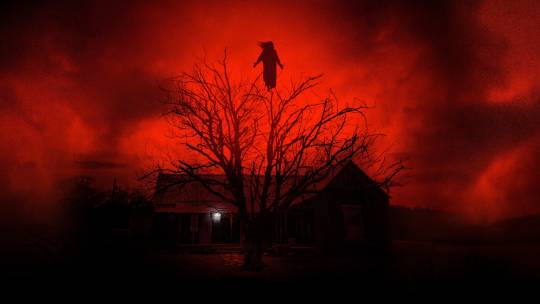
#9/ Relic:
Soon after Kay and her daughter Sam return to their remote family home following the disappearance of the family matriarch, the widowed Edna, they discover that something sinister has taken hold of both Edna and the house itself. Although Relic – which was co-produced by Jake Gyllenhaal and marked the feature directorial debut for Natalie Erika James – isn’t exactly offering up any enticing twists or salacious gore, or even a original concept for that matter, it relies on evoking dread and building tension to compel its audience to stay invested until the bitter end.
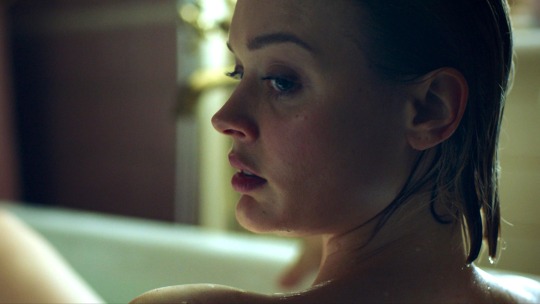
#8/ Amulet:
Taking its sweet time to unravel, Amulet is centered around Tomaz, an ex-soldier who is now homeless but is offered a place to stay at a decaying house in London, which is inhabited by a beautiful young woman named Magda and her dying mother. As the story moves along, we see that Tomaz is starting to develop feelings for Magda, who seems a bit…off. His feelings for her don’t wane even after Tomaz discovers that there’s something insidious going on in the attic of the house, where Magda’s mother is seemingly imprisoned. Toss in a suspicious nun and you’ve got yourself a creepy little film that seems to have fallen between the cracks.
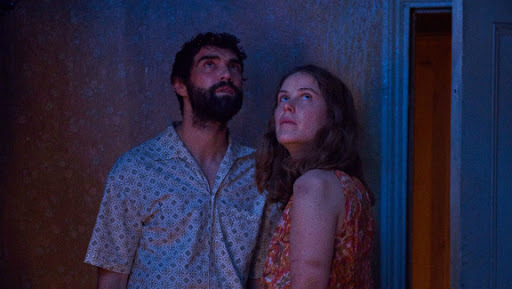
#7/ The Beach House:
One might argue that not a lot actually happens in The Beach House and that the payoff isn’t worth the investment, but if you go into this film with an open mind and zero expectations, you should at least be satisfied. Two troubled college students head to a deserted beach getaway to spend some time together, but end up struggling to survive alongside some unexpected guests as a mysterious infection disrupts their holiday. Although it is a slow build up to the film’s climax, it is a tense and intriguing ride along the way, as a series of unsettling events give way to an apocalyptic episode that feels almost like a throwback to the sci-fi films of the 1950s. Making his feature film directorial debut, Jeffrey A. Brown elicits with The Beach House those brooding existential thoughts that lay dormant in the deep boroughs of our minds.
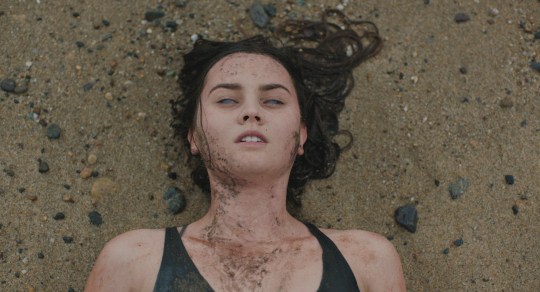
#6/ The Invisible Man:
There’s always an elevated risk when making a modern film based on an old story that has already been told through cinema numerous times before. The last time H.G. Wells’ 1897 novel The Invisible Man had been adapted by Hollywood was in 2000’s Hollow Man, which was panned by critics despite making a sizeable profit. The 2020 adaptation is far superior and is perhaps the best adaptation of Wells’ classic in any medium. Elizabeth Moss gives a stellar performance that draws real emotion, so that we agonize alongside her as she is essentially haunted by a relentless ghost hellbent on controlling every aspect of her life. We live in an era when technology has advanced enough to bring this 124-year-old story to life like never before, while a polished script and an exceptional lead performance gives The Invisible Man a deeper level of emotion and terror.
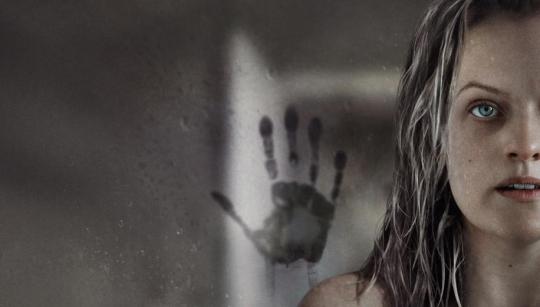
#5/ Saint Maud:
For most of Saint Maud it is unclear whether certain experiences are actually happening in reality for the main character or if it’s all simply in her head, as some sort of mental breakdown caused by a work-related tragedy. Maud is a young hospice nurse and a newly-converted Roman Catholic who suddenly becomes obsessed with “saving the soul” of the woman she is currently taking care of, Amanda, a hedonistic dancer with a chronic illness. Maud’s behaviour worsens, as does her mental state, as horrific scenes and visions make us question if she’s actually losing her mind or experiencing something beyond this world. Saint Maud is an A24 feature by the way, so that should be enough to know what you’re getting here in terms of quality.
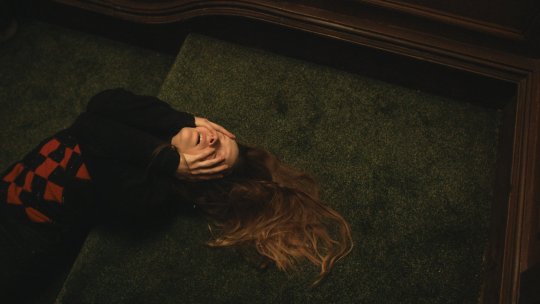
#4/ The Lodge:
Isolation is often embraced as a way to pad a horror film’s fear factor, and it works especially here in The Lodge, as a soon-to-be stepmom becomes stranded at a remote holiday home in the middle of winter with her fiance’s two children. The kids begin to untangle the dark past of their stepmom-to-be and a series of disturbing events transpire as their hope for survival fades. The Lodge is a dreary, atmospheric slow burn that leaves you somewhat unsettled. With its wintry backdrop, stylish sequences, and almost claustrophobic dread, the film doesn’t ever allow its audience to feel at ease for long, insisting that an underlying foreboding remain intact throughout. Although I found the ending somewhat disappointing, I immediately began to concoct a possible prequel that would delve into the backstory of the film’s lead character. One can hope.
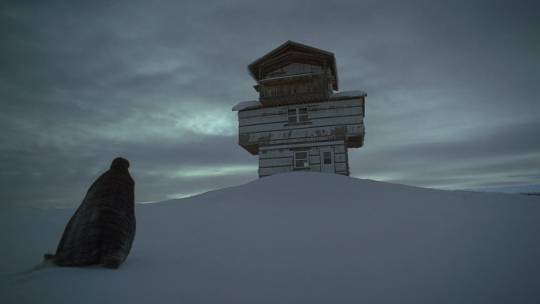
#3/ Host:
It’s increasingly difficult to be innovative and original when it comes to horror films these days, especially in the particular genre of so-called “found footage.” Rob Savage’s Host, however, comes off as something different, setting itself apart from most films in this realm in various ways. It centers around six friends who hold a séance via Zoom during a COVID lockdown, guided (at first) by a medium they hired. The séance then takes a dark turn and things soon escalate into madness. Sure, there are elements in Host that are prevalent in numerous horror films, but it uses a modern and topical way to implement them, while also refusing to overstay its welcome by cueing the credits less than an hour in. Overall, this film’s popcorn-and-Saturday-night-movie fun factor is why it ranks so high on this list.
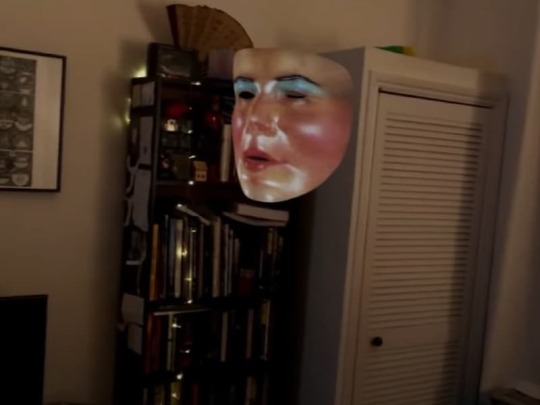
#2/ Possessor:
It’s always a treat to come across an original idea, especially when it’s within the horror realm, and Possessor is certainly unlike anything else I’ve seen in awhile. Andrea Riseborough plays an elite corporate assassin who uses brain-implant technology to take control over other people’s bodies in order to kill high profile targets, though with every mission she gets further and further away from her true self. With her latest possession, she becomes trapped in the mind of a man who threatens to obliterate her for good. It is a provocative vision by director-writer Brandon Cronenberg, who just so happens to be the son of legendary Canadian filmmaker David Cronenberg, and it serves as a disturbing piece of dystopian fiction that is even more frightening because it isn’t too far beyond belief.
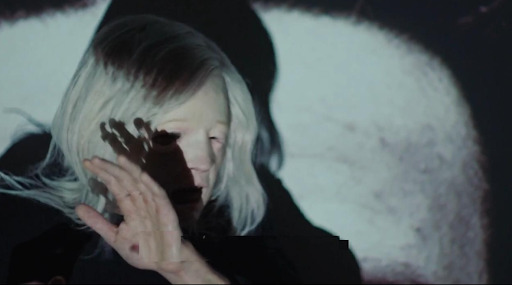
And because everyone else is doing it, here are five honorable mentions that narrowly missed the list:
- The Call
- Color Out of Space
- Don’t Listen
- The Mortuary Collection
- Porno
#1/ His House:
In addition to its emotional storytelling and genuine moments of terror, His House – from first-time director Remi Weekes – sheds a light on the plight of refugees in a way that feels both respectful and empathetic. After a Sudanese couple make a harrowing escape from their war-torn homeland, they are granted asylum in England, where they struggle to adjust and fit in. They are assigned a shabby house on the outskirts of London, where the couple begin to experience terrifying and unexplainable events. His House is built around a fresh concept, two fantastic leads, and some truly haunting imagery, and I wish that more horror directors would put as much effort into quality filmmaking as Weekes did here. If this is his first venture into feature filmmaking, I am excited to see what his future has in store.
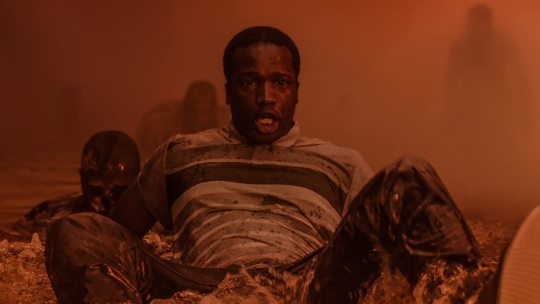
There you have it, my Top 10 favourite horror films of 2020. What did you think and were any of these titles on your own Top 10 list? Please tell me your thoughts and recommendations in the comments below.
youtube
5 notes
·
View notes
Photo
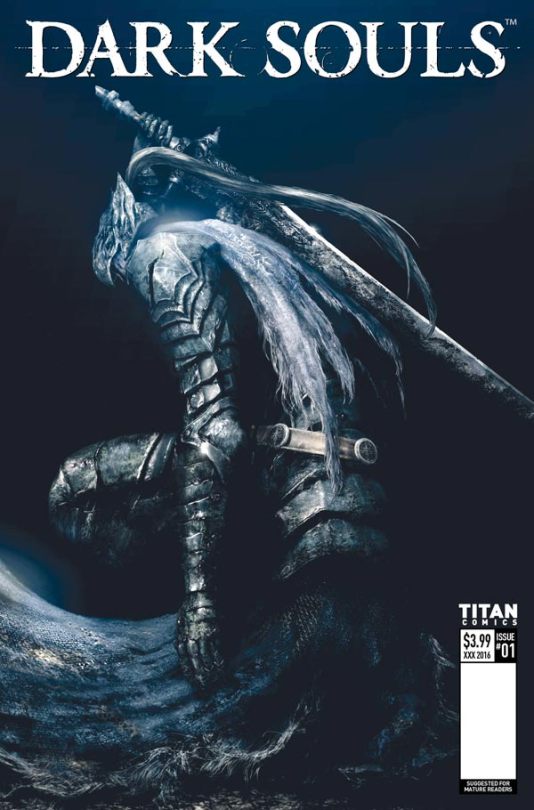
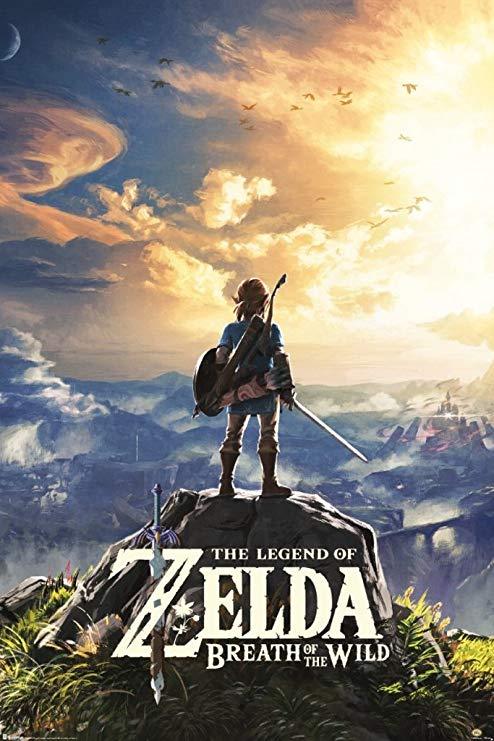
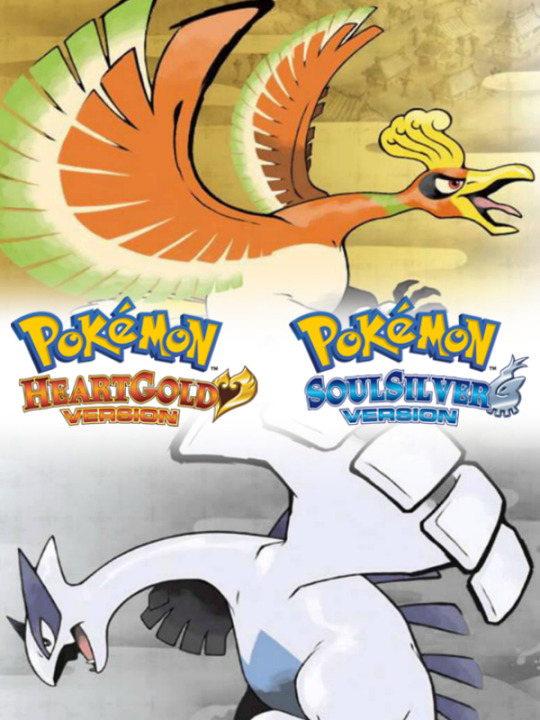
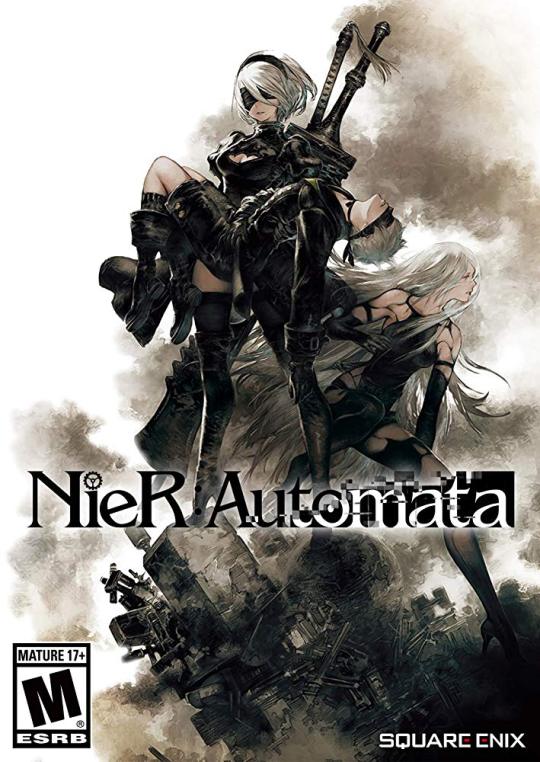
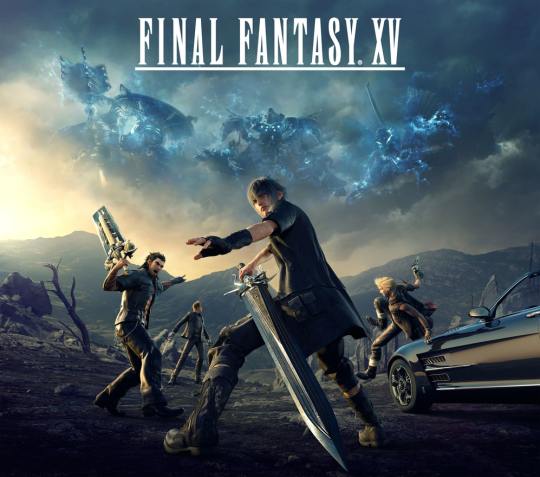
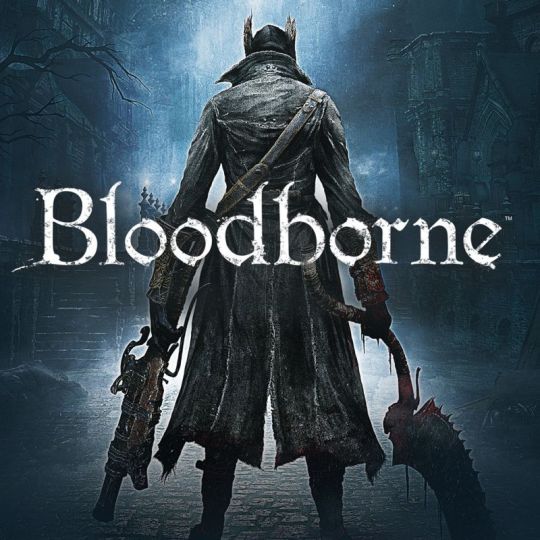
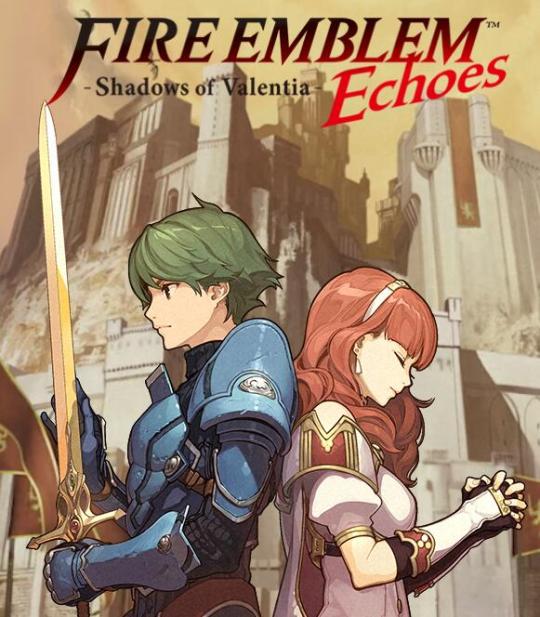
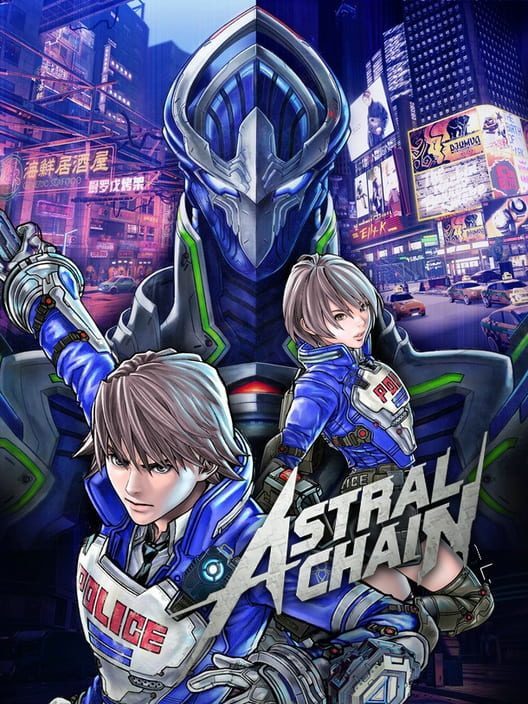

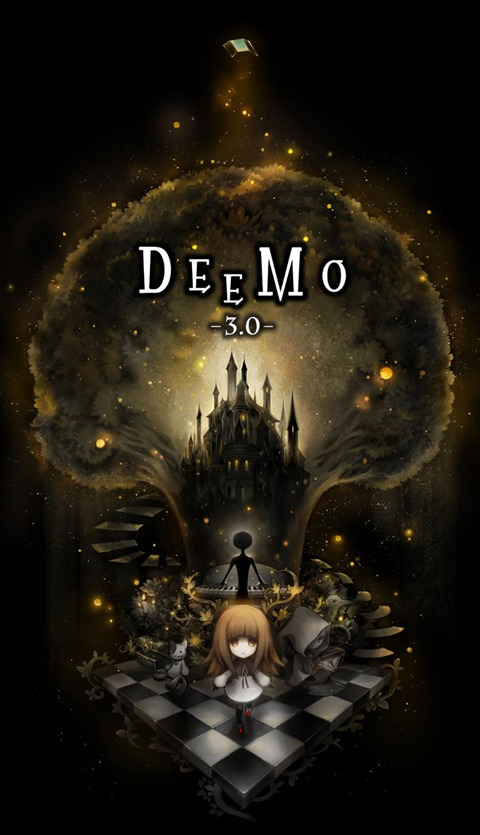
With 2019 coming to an end, I wanted to make a list of my personal top 10 video games that came out this decade. I was 12 in 2010, and now being 21 video games have always been important to me! Many of the games that are the most dearest to me sadly came out before 2010 (HG/SS barely made the cut with the NA release). I tried to not make recent releases be part of my bias (FE3H lol), plus there were many games such as Bioshock 2, Fallout New Vegas, DA2, ACNL, and many more that I love but this list would have been too long!
1. Dark Souls (2011)
2. The Legend of Zelda: Breath of the Wild (2017)
3. Pokemon HeartGold/SoulSilver (NA 2010)
4. NieR Automata (2017)
5. Final Fantasy XV (2016)
6. Bloodborne (2015)
7. Fire Emblem Echoes: Shadows of Valentia (2017)
8. Astral Chain (2019)
9. Granblue Fantasy (2014)
10. Deemo (2013)
Dark Souls: Although I haven’t really completed the game personally, I’ve seen many playthroughs and videos about the story and characters. Hidetaka Miyazaki is absolutely awesome in creating those fantasy worlds and characters, everything that Dark Souls ended up influencing was pretty groundbreaking. And the OST is always enjoyable to hear again.
Breath of the Wild: This game took quite a long time for Nintendo to release, and when it finally came out on the final year of the WiiU and the birth of the Switch... it was pretty emotional. Also to realize that Iwata-san never made it to see the rise of Nintendo’s success after the failure of the WiiU gets me everytime, but I hope he sees all the smiles and joy BOTW has brought since its release. The game changed not only what is a LOTZ game but what is an open world, I’ve played it twice and each time I picked it up was a new experience.
Pokemon HG/SS: This game was released around Fall 2009 in Japan, but for NA it was out in March 2010. I still remember the anticipation for Spring Break to arrive in order to spend all my week playing it! I never had the chance to play the original Gold/Silver, so everything was new to me. My 12 year old mind almost exploded when I ended up finishing the Johto League only to find out we were ALSO traveling to Kanto!!! I was shook! This game is amazing, and I’ll forever wait for them to somehow add our Pokemons following us around, that mechanic was so cute! And of course the OST is golden, and I can always listen to it and be brought back to those days.
NieR Automata: I never played any of the past NieR games (although I was aware of their existence). The first trailer I ever watched had the “Become as Gods” song so I was hooked from the start! And learning that PlatinumGames and Square Enix both developed the game made me hyped for its release. I love everything about it, the characters, story, music, themes. By the time I finished the game, it had brought me into a journey of questioning so many heavy topics about life...I really wasn’t expecting that about a game. Not going to lie it may or may not have brought me a mini existential crisis but with a game made my Yoko Taro can’t be too surprised.
Final Fantasy XV: The game I so often heard fabled tales since as back as 2009 and the hype was just building up for this game! I remember going to the movie theater when they were having special screenings for the Kingsglaive movie (I dragged my friend, little brother, and mom lol). The game went through so much, many cuts and changes were made but I personally ended up liking what we got. Still super sad that many unreleased DLC’s were cut off, but the love I have for the characters and music will always stay.
Bloodborne: Hey another Miyazaki game, what can you say...the man just makes brilliant games. He took everything I love about gothic, victorian era, and Lovecraftian esque and made this extraordinary game. I’m here hoping that maybe this 2020 we can hear a slither of news of Bloodborne 2, the theme for this game is too good for them to leave it as only one game.
Fire Emblem Echoes SoV: After the train wreck that was Fates, I literally was not expecting for us to get another FE title so soon! Japan waited 2 years for Echoes but thanks to localization giving us Fates in 2016, we got SoV a year later. I never heard of Fire Emblem Gaiden, before this game I never played any of the Japan only FE games, so when news was coming out about this title I tried 100% to AVOID it. Why? Because this was the first time I could start a FE game without personally knowing anything about it, and when I first played it, right from the start it felt so different, it didn’t felt like a Fire Emblem game (which isn’t bad at all). With the new art direction it also felt like a whole new world, I love Hidari and I hope we get to see them more in future FE games. The game had a simple plot which I didn’t held it against them, I knew this was a remake, and personally I’m glad they didn’t added things like an Avatar or S-Supports. They stayed true to its original source, and SoV will stay as my personal favorite FE game. Also Heritors of Arcadia will be the best vocal theme we got in FE series.
Astral Chain: Oh snap another PlatinumGames IP? This developers are just too good! Astral Chain came out of nowhere although I’ve heard it was worked on for a long time, supposedly even before NieR Automata was developed. I really enjoyed the game very much, from all the 2019 games that came out it caught my eye and I went in with not too many expectations but I had a good time. The story took a crazy turn and I could see some similar themes as NieR Automata but it held its own ground to become unique. The fighting mechanics were so much fun to play and the music was also awesome! I wish more people talked about this game since it is Nintendo’s new IP. I hope we can get the twins for Smash Ultimate!
Granblue Fantasy: I first new anything about Cygames back in 2016 when I saw the OP for Rage of Bahamut. After Seeing the OP for season 2, seeing Azazel in all his glory I knew I had to watch the anime! Luckilly Rage of Bahamut season 2 was continuing in 2017 so I was able to catch up just in time for its final 10 episodes. I LOVE Azazel and Kaisar and of course ROB Lucifer! Then to my surprise I found out about GBF, and I was dumb and thought the app was unavailable in the west which is technically true since you need a Japanese account to download the app which has an ENG text option. So it wasn’t until 2018 that I downloaded the game and started my journey through the sky. This gacha game literally changed what is a gacha game to me, the developers listen to fans, the community is fun, and just everything about this franchise is so great. I’m not a hardcore player so I’m not too worry about grids, I’m here for the cute husbands. (Lancelot, Sandalphon, Albert, Grimnir I lov u).
Deemo: I love this game, one of the best app games I’ve ever had. Back in the day I used to play TapTap Revenge and that was my first taste of rhythm games, Deemo brought me back to those types of apps. Whenever I was anxious I could always play this game and pass the time while keeping my mind busy. Plus without Deemo I would have never known artist’s such as Mili. The game is on the Switch which I’m so happy because I was able to just get all the songs without flooding my tablets storage space.
#i won't explain why these are my favs since it will literally turn into an essay#fire emblem echoes shadows of valentia#fire emblem echoes#dark souls#darksouls#botw#loz#the legend of zelda#pokemon heartgold#pokemon soulsilver#ffxv#nier automata#top 10#bloodborne#astral chain#gbf#deemo#video games#list
152 notes
·
View notes
Text
Ghosts Series 2: ‘They’re stuck in an existence they didn’t ask for… like all of us’
https://ift.tt/35QzhQ6
The Ghosts creators have worked together for over a decade. To-date, the six-person team (Mat Baynton, Simon Farnaby, Martha Howe-Douglas, Jim Howick, Laurence Rickard and Ben Willbond) have written and performed in long-running children’s sketch comedy Horrible Histories, three series of fantasy sitcom Yonderland, feature film Bill, and two series of the supernatural BBC comedy Ghosts, with a third on the way.
Channelling Mrs Merton asking Debbie McGee what first attracted her to the millionaire Paul Daniels, I ask Baynton and Howick via Zoom what inspired the group to write Ghosts, a sitcom about a group of individuals who frequently drive each other nuts, trapped together for what may well be eternity?
Both laugh. “I’m sure we do drive each other nuts in many ways,” says Howick, “but the truth is, like the ghosts, what we always come back to in these episodes is that they love each other and don’t know what they would do without each other. I think that can be said for the group?” He looks to Baynton for confirmation and gets a happy nod.
Considering the well-documented fallings-out and imploding egos of other comedy gangs – the Pythons not least among them – this level of harmony over such a long period feels remarkable. What’s their secret? “I think we keep each other honest,” says Baynton. “There are certainly heated debates.”
Heated’s too strong a word, says Howick. “We only really fight for our opinion, we never fight each other.” On the rare occasion that there isn’t unanimity about a particular topic, there might be a locking of horns and a democratic vote, but real arguments don’t happen. “There’s no animosity or jealousy with each other’s independent careers,” he explains. “We are our most important project. We have no desire to work each other up. We’re all genuinely fond of each other.”
That much is clear watching them interact. The online BBC press launch for series two was punctuated by the group making each other laugh. Silly voices. Running jokes. At one point, to the absolutely delight of his colleagues, Simon Farnaby’s crotch moved unavoidably front and centre as he stood up in front of his webcam to adjust a window blind. The rapport is real.
Indeed, during UK lockdown, say Baynton and Howick, the group’s regular Zoom calls drafting Ghosts series three were a godsend. Aside from the boon of having regular work when so much of their industry was in uncertainty, being able to see friends for three hours on a Wednesday evening kept them sane.
“It’s been a tonic in an otherwise relatively difficult and quite miserable time to have been able to jump on Zoom and make each other laugh with ideas for these characters that we love,” says Baynton. Entertainingly, when the group splits off into writing pairs, each does impressions of the absent characters while drafting dialogue. “It’s funny,” remarks Howick. ‘When we come together as a six, if we’re trying to pitch a positive idea, it’s usually done in a [segues into the regional accent of his upbeat character] Pat voice. Or if it’s a melodramatic idea or if it’s over-the-top, it might be a [Baynton’s Romantic poet character] Thomas voice.”
Via video chat, it took a little longer for the group’s writing wheels to start turning. Ordinarily a new series would start with two weeks of the gang together in the same room. Stretching that to months of three-hour Zoom calls, fitted in amongst home schooling for the parents among them, was an adjustment. “The energy that you would bring to a room at 10 o’clock in the morning in an office wasn’t there,” says Howick. “You’d have to try and generate this feeling even though everyone was exhausted.”
Howick found himself seeking out frivolity to reach the right frame of mind. He played videogames. “If I sat and thought too hard about what was going on outside my door, it would make me really sad, and so in order to keep a vital part of me going, in order to meet with Mat and the others every Wednesday and keep that bright demeanour, it was good to do that.” The writing momentum started to return with the ease of lockdown, says Baynton. “The simple mental health-saving fact of being able to meet up with family in a garden helped a lot.”
Read more
Movies
Yonderland: saluting a brilliant fantasy comedy
By Rachel Meaden
TV
The Teleprompter Interview: Katy Wix ‘My First Screen Crush was King Kong’
By Louisa Mellor
Trying to write comedy against a such a serious backdrop of world events also felt uncomfortable, says Baynton. “You feel like it’s almost… immoral is too strong a word, but when there are nurses and doctors and teachers and crucially important people doing the work they do… It felt like an elephant in the room to be tap tap tapping away at a story about another day at Button House and what the ghosts are up to.”
It helped to know how warmly Ghosts series one had been received by its many fans. “What’s touching is when we do get messages from fans who say how much the show means to them. I know how important comedy has been to me in my life, so if we can be that to other people, it doesn’t feel completely frivolous.”
Ghosts, with its colourful selection box of characters (there’s a caveman, a headless Elizabethan, a 17th century witch, an excitable Regency woman-child, an Edwardian snob, a WWII captain, a 1980s scout leader and a 1990s Tory politician) may look frivolous, but series one had moments of real pathos. Baynton is proud of the fact that the series doesn’t shy away from the bleaker side of its ‘dead people’ premise. “If you really interrogate the truth of it – these are people who lived, people who died, people who loved or were thwarted or killed or suffered injustices or never got to love the person that they admired…”
The original idea was for a much bigger cast of ghosts, with everybody playing multiple parts, Horrible Histories-style. It quickly became clear that the story needed to home in on a small ensemble, giving the gang what Howick calls “its own silhouette”. Had they stuck with the original plan, “It would have been like The Muppet Show,” he says. “Every week would only have scratched the surface.” Too many ghost characters would have diminished the show’s emerging premise, says Baynton, which is about “being stuck forever in a tedious and endlessly repetitive existence.”
A bit like lockdown, we joke. Exactly, says Baynton.
“We talk about this a lot. The way I see it is that their situation is just the same as a living person’s: they’re stuck, they’re in an existence they didn’t ask for, they don’t know why they’re there or what happens next. They know that there is a next ‘thing’ but whether they go to heaven, or hell, or something else, they don’t know. They’re just the same as people on earth.”
Howick agrees, “Their existence is very mortal in that respect.”
Writing about the afterlife, a sense of existential metaphor is unavoidable, says Baynton. “There is something deeply relatable about it, which is where sitcom will always thrive. You can’t really fail to connect with a story about a person who doesn’t know what to do with their time or who feels stuck. Regardless of class or job or circumstance, that is all of us.”
If the ghost characters are all of us, they’re also peculiar to their time period. The collision and unexpected blending of different social contexts is where much of the series’ comedy comes from. Howick compares the composition of the group to Blackadder Goes Forth, which kept “ranks of characters from different classes stuck together in a hell hole, cheating death every single week.”
The source of much of the comedy is thwarted status, says Baynton, “It’s the stuff of Alan Partridge and Hyacinth Bucket and Basil Fawlty… people who see themselves a certain way but who aren’t that way to the audience. Every single one of the ghosts is that to some extent. Anything that gave you status in life, you’re robbed of the second you die, so that’s already pretty funny in the sense of a captain who can’t lead, a wealthy woman who has no wealth, a politician who is not recognised as an authority, a poet who can’t pick up a pen, a Scoutmaster with no kids…”
“Not Scoutmaster!” interrupts Howick. “Adventure Club leader!” Before series one aired, they were instructed not to use the “Scouts” organisation name in scripts. “That was before they knew who Pat was going to be,” says Howick. Pat, for info, is a sweetie, and the Scouts should be proud to have him. He’s also a vibrant dancer, as series two, episode two shows.
“There’s a lot of dancing this series” says Howick. “Without giving too much away, there’s dancing in the last episode. I think Thomas’ best dance is at the end.”
Fans can expect more playfulness with series two. Now that the characters are established and the tone has been taken to heart, the team could afford to experiment a little more. “With series two, because the audience hopefully are with us at this point, we can throw different curveballs,” says Baynton.
“In that way that The Simpsons or those long-running American things, you can suddenly do one in black and white, as if it’s a Hitchcock thing. We’ve definitely had fun. There’s an episode later in the second series which is a format of its own. We’re thinking about those things for series three, being free to be really playful with it.”
There’s a Christmas special episode to come, “the last one ever to be filmed!” joked Farnaby at the press launch. The timing on series two’s filming was especially jammy, with only one day lost to the UK TV and film industry shutdown in March. They made the decision not to use supporting artists in the last scenes filmed, set in a Medieval plague village. The irony of having to tell actors they couldn’t come and play plague victims because there was an actual plague wasn’t lost on them, says Baynton.
Thomas gets a gun in series two, they tease, and we’ll find out how he met his end. “The burning question for fans of the show is how the characters died, and you will find out some in each series,” says Baynton. “There are some we’re holding onto for as long as we possibly can, but rest assured, they’re coming!”
cnx.cmd.push(function() { cnx({ playerId: "106e33c0-3911-473c-b599-b1426db57530", }).render("0270c398a82f44f49c23c16122516796"); });
Ghosts series 2 starts on BBC One at 8.30pm, with all six episodes available to stream afterwards on BBC iPlayer.
The post Ghosts Series 2: ‘They’re stuck in an existence they didn’t ask for… like all of us’ appeared first on Den of Geek.
from Den of Geek https://ift.tt/2RKeoxw
7 notes
·
View notes
Text
Jane the Virgin 3x03 Chapter Forty-Seven
Click here for previous recaps!
Stray thoughts
1) I really hope this is not another bait...
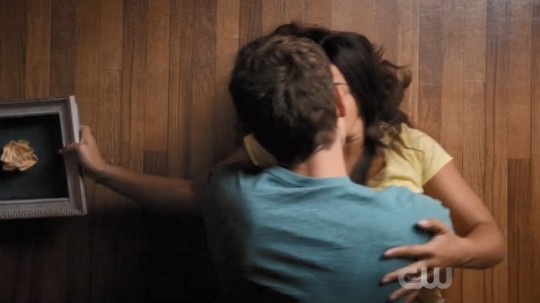
There’s so much buildup that I wonder if this is going to be disappointing. Or if it will even happen at all…
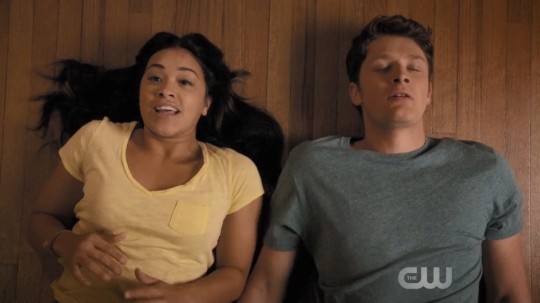
Well, we’re back to where they got the go-ahead from the doctor, but...
2) People keep interrupting them, and I just wonder why Jane won’t just be open about it and tell her mom, dad, and grandma that they want some privacy to finally get laid!
3) “If you weren’t a singer, what would you be?”
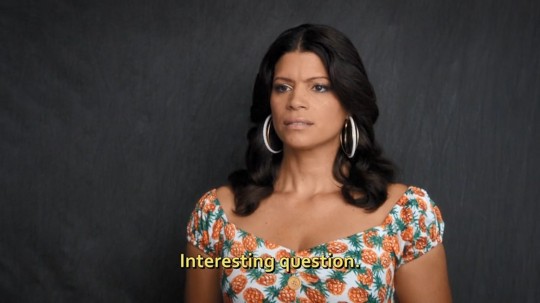
It’s an interesting question indeed, considering she’s not really a singer and she hasn’t done much with her life so far. It’s a weird question to be asking yourself when you’re pushing forty, right? But I guess Xiomara always followed her impulse and that’s how she led her life, there wasn’t really much time to think about what she wanted to do. I’m kind of curious to see where they go with this.
4) New character, I guess?
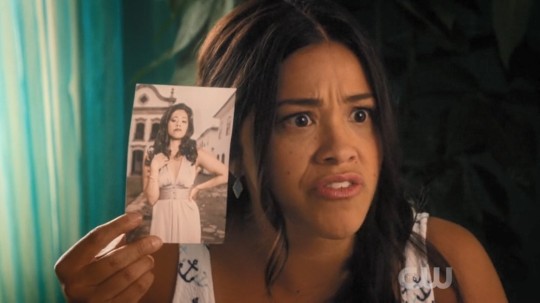
So, this is Cecilia, Alba’s sister and the one responsible for telling everyone Alba wasn’t a virgin on her wedding day.
5) Oh, thank god!
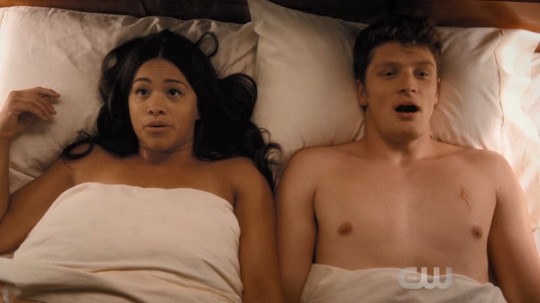
I found the whole “You and I finishing at the same time” comment… odd? And tbh, Jane doesn’t look very satisfied. But at least she got it over with! Of course, he fell asleep right after, and it doesn’t feel as magical as she’d expected, I guess. But I mean, why should it? Expectations about the first time having sex should be very low, but culturally women are raised to make this huge deal of their “first time” and “losing their virginity”, and it’s very difficult to shed those expectations, right?
6) OMG she’s sending a sex tape of her first time with her husband to her advisor!
But… the most important question is, is she going to watch that video? Will Michael and Jane watch it? Will they do a play-by-play analysis? Will he notice that she didn’t really come?
7) “It was actually my first time” “Oh, that explains things…”
Well, the advisor (I’m sorry, can’t remember her name!) made it out to look like she was talking about her writing – which she might well have been – and how it was lacking something. I think I’ve actually mentioned this before, but It’s kind of odd for Jane to be a romance writer and to be writing sex scenes without actually having experienced sex herself. The advisor makes a good point – romance without sex is just fantasy. And I’m not saying that you can’t have romance if you’re asexual. But that’s not the type of stories Jane is writing or the audience she’s writing for. Anyway, I think the advisor was actually talking about her performance in the tape and not her writing. Or maybe both.
8) I knew it.
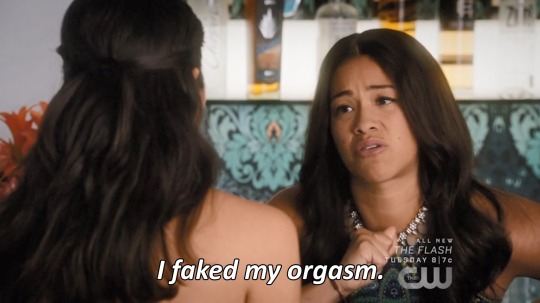
And of course, her friend tells her NOT TO TELL MICHAEL, and I’m like, huh? I just wish this would stop being a storyline? Both the faking and the not-talking to your partner about your feelings regarding the sexual experiences you share with them. Not having an orgasm is just part of the sexual experience and there’s nothing wrong with it, and sex can still be enjoyable even when you don’t have an orgasm. So let’s see where they take this storyline. I’m guessing Michael is going to be super supportive, and will try to make it up to her.
9) Why is this still a thing in this show? We get it, Luisa is a fucking moron, and she makes terrible decisions. I wish there was more to her character than that.
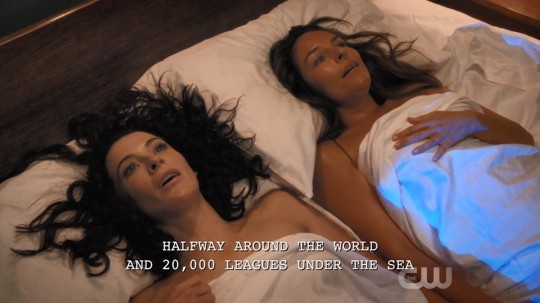
10) And I know that we crave representation for LGBTQ+, but… Rose is a fucking psycho? And this is almost a textbook abusive relationship? She’s literally kidnapped Luisa, isolated her, and keeps telling her how she’s alone and Rose is the only one there for her. (and I’m not even touching on the whole murderer/drug lord thing because that’s just part of the zaniness of this show.)
11) Okay, Xiomara is considering moving on from singing, but move on to what?
12) I genuinely laughed at this.
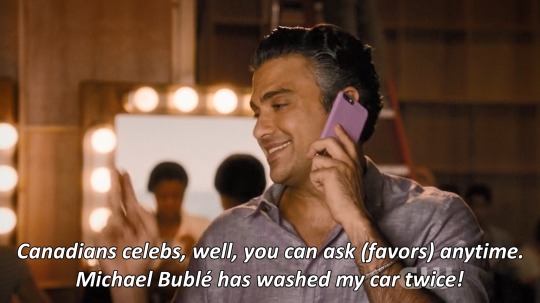
13) Okay, I liked this joke.
JANE: What’s the CW? Like a streaming thing? ROGELIO: No, no! It’s a huge network! Look it up! Amazing shows! Fabulous line-ups!
Anyway, Jane is very intent on manipulating her mom into finding her passion for singing again, and I don’t know how I feel about this. Yes, Xiomara loves singing, but what is wrong with giving up? She hasn’t really made it, and there are other things she might be passionate about that she hasn’t figured out yet because she’s been pursuing her “singing career.” I know Jane is trying to be supportive, but if she truly were, she would just try to help her mom to find what other avenues she can pursue instead of tormenting her with her unfulfilled dreams. It just feels like another thing Jane does because it’s what she wants rather than being selfless and thinking of others.
14) See? This is why you should be honest with your partner about your orgasms or lack thereof…
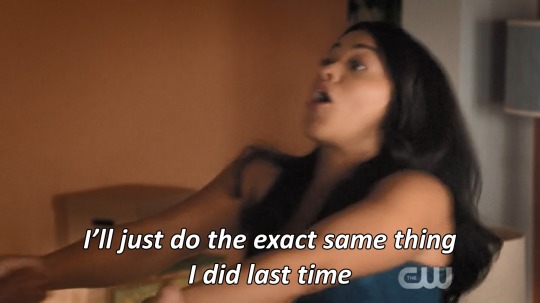
At least it led to an honest conversation. Which led to this…
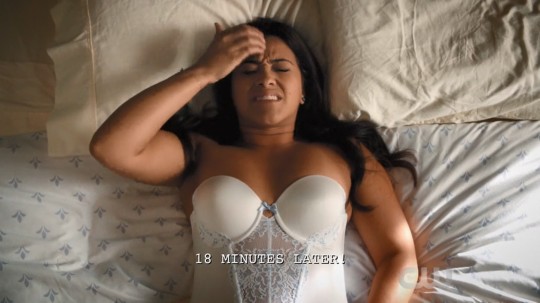
15) I’m loving this Cecilia character. I kind of wish she was the leading lady, actually. She’s so fun, even if she’s a figment of Jane’s imagination!
16) Rogelio is selling his show to the CW, but Rob Lowe will be the leading man, not him. I see how this could easily lead to an existential crisis for Rogelio, but I have so much faith in him, he’ll probably take it in stride and turn into a bigshot Hollywood producer.
17) Hm. Day two and Jane is already trying to spice up their sex life? This doesn’t bode well. And Michael is telling her not to discuss their glitch with anyone to protect his fragile ego? Because he tells her she can say they had sex, but that she shouldn’t mention how it wasn’t good? Double hm. And now Jane is with Xiomara, someone who could actually help her get out of her head and understand what she’s going through, but she keeps her mouth shut because Michael’s ego is more important.
18) And then she finds this…
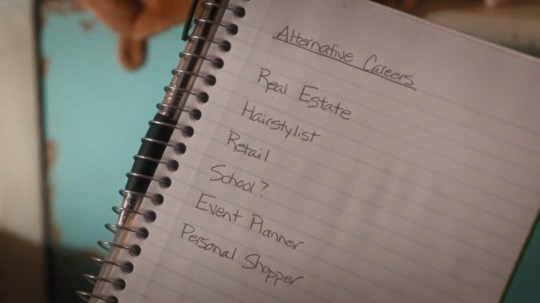
I hope this sets her straight.
19) So… instead of getting on board with Xiomara wanting to move on after finding the list, Jane and Rogelio continue to plot to get her “back on track.” But why?
20) For a second, I thought Rafael had truly sent a caring, loving email to his sister, but it seems to be a ploy to get her to reply and reveal her location. Considering she’s a moron, she’ll probably fall for it, but it’s kind of sad? When she was reading the email, I was hoping it would be her wake-up call (if the fact that she literally jumped and gasped when Rose walked into her room wasn’t already a warning sign…) and that she would try and leave this toxic relationship. But if she’s being lured by false declarations of brotherly love… I don’t know, it feels wrong. Yes, she’s a fucking moron, but what makes her a moron is that she’s constantly looking for love and affection. That’s always her downfall.
21) Now, that is a cameo…
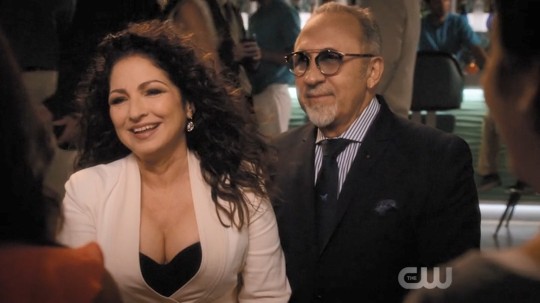
Loved the fan bit!
22) So… Rogelio got freaking Gloria Estefan to help Xiomara, but it never occurred to him that it might have the opposite effect. Because Xiomara has seen Gloria and Emilio casually sitting there and watching her show and she’s freaking out.
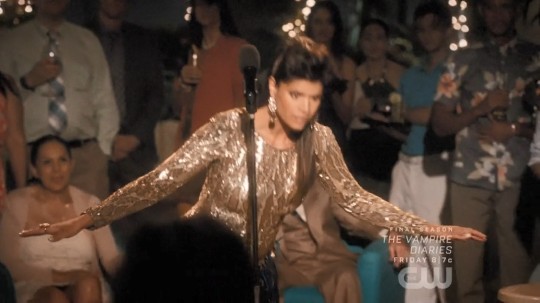
You bow to royalty.
23) So… Lina Has just offered to help Michael and Jane and demanded a play by play, and Michael remembered the sex tape. He’s not going to show it to Lina, though, right? He’s just going to watch it and figure out what went wrong.
24) Oh, no she didn’t!
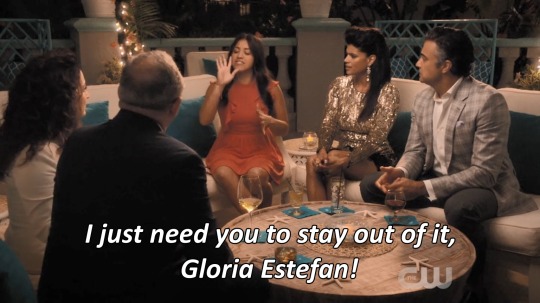
Why is she so intent on convincing Xiomara to continue pursuing a career that hasn’t really worked out for her? She hasn’t made it, and it doesn’t look like she will anytime soon, and that’s OKAY! What’s wrong with wanting to try other things? What if she’s really talented at something else and she’s missing the opportunity to shine because she’s stubbornly fixated on being a singer? And why does it matter so much to Jane? Why does she need to control everything and everyone’s lives?
25) So… this whole obsession with Xiomara’s career is because… Jane gave up her virginity? Huh? That doesn’t make sense? How is Xiomara’s singing career a metaphor for Jane’s virginity? I’m just confused! The show is usually very good at pulling off this type of parallelism and metaphors, but this time it just didn’t work for me.
26) See? Xiomara had the right answer all along:
“With sex, it can take time to find your groove and figure out what you like, what you need. You’re just starting out. You’ll get there.”
27) So… they end up watching their own sex tape, and finally have satisfying intercourse, I guess. I kind of wish this storyline hadn’t been resolved in an episode, though, it doesn’t feel realistic.
28) So, that was the reason for the riff between Alba and her sister Cecilia…
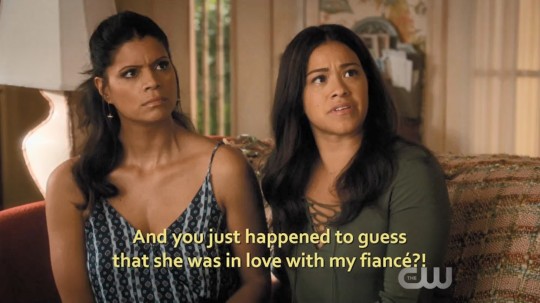
29) Why am I always so much more invested in Rogelio’s storylines?
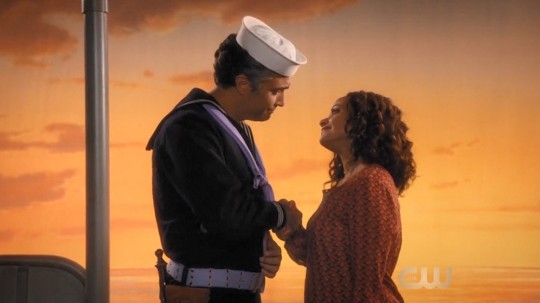
He apologized for the way he broke-up with her, and then they decided to embrace their artistic connection. And now he has six months to become famous in America so that he can be the lead of his own show in the CW hahaha! I feel this storyline will be lots of fun.
30) Look what the cat dragged in…
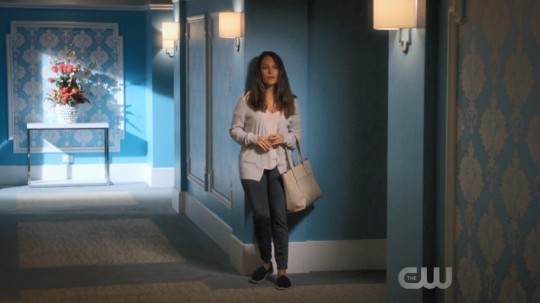
…a moron thirsty for love.
31) So… I guess Rose lied about the whole “I’m not a criminal anymore” thing. Shocker.
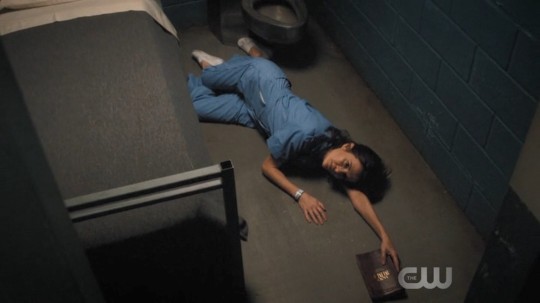
Rafael’s mom was on her kill list, before she even killed her. And Muter died holding a bible and clamoring for her son. I guess this will be Rafael’s storyline, then.
32) To be honest, I wasn’t a fan of this episode. Usually, the plot A and plot B are connected in a way that makes sense, and this week, it felt a bit far-fetched to have Jane obsess over Xiomara’s singing career because she had let go of her virginity. I don’t know, what are your thoughts? Let me know in the comments!
33) Hope you enjoyed my recap, and, as usual, if you’ve got this far, thank you for reading! If you enjoy my recaps and my blog, please consider supporting it on ko-fi. Thanks!
#Jane the Virgin#Gina Rodriguez#Jane Villanueva#Rogelio De La Vega#JTV#JTV recap#JTV 3x03#mine#recap
3 notes
·
View notes
Text
The Director’s Series: Nicolas Winding Refn
The director series will consist of me concentrating on the filmography of all my favorite directors. I will rank each of their films according to my personal taste. I hope this project will provide everyone with quality recommendations and insight into films that they might not have known about. Today’s director in spotlight is Nicolas Winding Refn
#9 - Fear X (2003) Runtime: 1 hr 31 min Aspect Ratio: 2.35 : 1 Film Format: 35mm

When his wife is killed in a seemingly random incident Harry, prompted by mysterious visions, journeys to discover the true circumstances surrounding her murder.
Verdict: Refn’s most forgotten about film, even I have a hard time remembering that this film is part of his oeuvre. Nevertheless, Fear X is a quiet and lingering exercise in style. It’s a surrealist film noir with heavy influences from David Lynch. It’s also the first time where Refn began experimenting with color and started to move away from shaky cam.
#8 - The Pusher Trilogy (1996/2004/2005) Runtime: 1 hr 45 min / 1 hr 40 min / 1 hr 30 min Aspect Ratio: 1.66 : 1 / 1.85 : 1 / 1.85 : 1 Film Format: 16mm / 35mm / 35mm

A drug pusher grows increasingly desperate after a botched deal leaves him with a large debt to a ruthless drug lord.
Verdict: I made the decision to categorize all three Pusher films as one entry for this post (otherwise it would just be too many). Nicolas Winding Refn started off his career with the strong crime tale of Pusher, and made the last two films to complete the trilogy after his English language debut Fear X ended up bombing. While I love the first and third entry more than I do the second, all three Pusher films are captivating and anxiety-ridden crime docudramas. It’s a great way to see how far Refn has evolved by starting with these films first.
#7 - Bleeder (1999) Runtime: 1 hr 38 min Aspect Ratio: 2.35 : 1 Film Format: 35mm
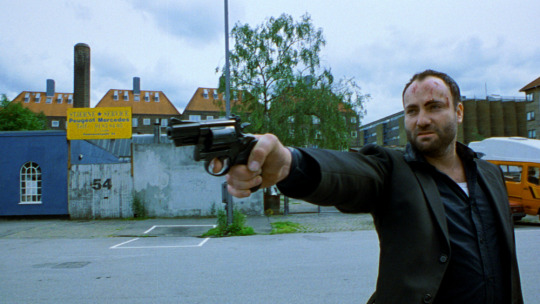
Two stories for the price of one: Lenny works in a video shop and tries to get acquainted with the waitress Lea. Leo can't cope with the pressure of becoming a father, leading to trouble with his pregnant wife and especially her brother.
Verdict: While Bleeder might be Refn’s lowest budget film to date, and not all the violence comes off as extremely convincing, I enjoyed it more than all three Pusher films because of the emotional stakes within the story. Multiple characters lives intertwine and interconnect in oftentimes disastrous circumstances. I also loved how Mads Mikkelsen’s character is a huge film aficionado, all of the scenes he is featured in bring a much needed reprieve from the turmoil and abuse.
#6 - Too Old to Die Young (2019) Runtime: 15 hr Aspect Ratio: 1.85 : 1 Film Format: Arri Alexa Digital
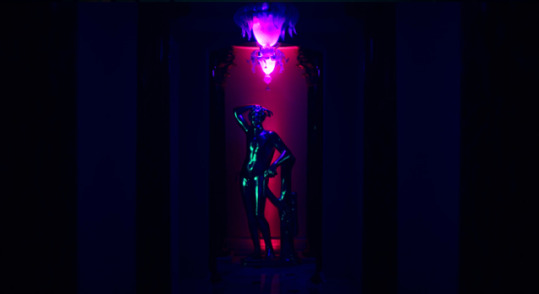
The numb existences of Martin Jones, a police officer with secrets to hide, and Jesus, a traumatized avenging son, collide in a ghostly Los Angeles where several ruthless criminal gangs fight for their turf and dictate who lives and who dies. Verdict: Too Old To Die Young finds the celebrated auteur, Nicolas Winding Refn, sharing his view of humanity and society at its most despicable. All of his usual motifs and creative decisions are employed in full force with Too Old To Die Young, sometimes to an almost unbearable degree unless you are a truth Refn aficionado. His long takes, infinitesimal silences between lines, neon lighting, synth score and characters belonging to a criminal underworld are all utilized to great affect within the series. And while I believe that Refn’s sensibilities are best conveyed through a film medium, the limited series allows Refn to explore what he wants to convey like an artist adding layer upon layer of colors onto a blank palette.
#5 - Bronson (2008) Runtime: 1 hr 32 min Aspect Ratio: 1.85 : 1 Film Format: 35mm
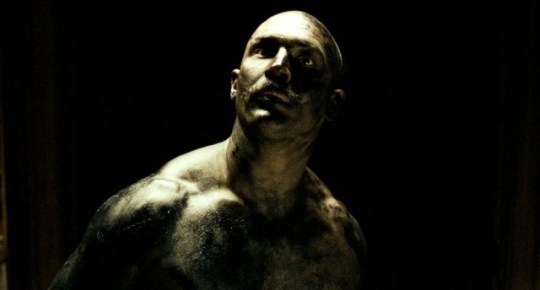
A young man who was sentenced to 7 years in prison for robbing a post office ends up spending 30 years in solitary confinement. During this time, his own personality is supplanted by his alter ego, Charles Bronson. Verdict: Bronson is quite possibly Tom Hardy’s most impressive performance, and that’s saying a lot. It exudes such a hypnotic quality that every time I watch it, it’s as if I am seeing the film for my very first time. It tells the true story of one of Britain’s most infamous criminals.Refn’s visual flair and unique filming style make it unlike any other prison film I’ve ever witnessed. This is the beginnings of Refn’s disinterest in traditional narrative structure.
#4 - Only God Forgives (2013) Runtime: 1 hr 30 min Aspect Ratio: 1.85 : 1 Film Format: Red Epic Digital

Julian, who runs a Thai boxing club as a front organization for his family’s drug smuggling operation, is forced by his mother Crystal to find and kill the individual responsible for his brother’s recent death.
Verdict: This is easily Refn’s most frustrating film. Whenever I watch it, I’m unsure whether I adore it or dislike it. But the fact that it’s the Refn film I have probably revisited the most is extremely telling of the ambience that Refn creates. Only God Forgives is arguably the most beautifully shot film from Nicolas. The neon drenched streets of Bangkok are presented to look like a netherworld. It’s a revenge fantasy thriller mixed with Oedipal undertones. Also, Gosling looks like a treat in every frame.
#3 - Valhalla Rising (2009) Runtime: 1 hr 33 min Aspect Ratio: 2.35 : 1 Film Format: Red One Digital

1000 AD, for years, One Eye, a mute warrior of supernatural strength, has been held prisoner by the Norse chieftain Barde. Aided by Are, a boy slave, One Eye slays his captor and together he and Are escape, beginning a journey into the heart of darkness. On their flight, One Eye and Are board a Viking vessel, but the ship is soon engulfed by an endless fog that clears only as the crew sights an unknown land. As the new world reveals its secrets and the Vikings confront their terrible and bloody fate, One Eye discovers his true self.
Verdict: Valhalla Rising is Refn’s dirtiest and bloodiest work, and it certainly finds the director at his most surreal and existential. If anyone wants to know a film that epitomized what it means to be considered art house - this is it. It’s a film about a slave finding emancipation from his tyrannous slave owners, and finds himself on a doomed voyage to the New World with a group of fanatical Christian vikings. The story is told in separate chapters, with each section the audience finds itself traveling down a rabbit hole that resembles something of an acid try gone awry.
#2 - The Neon Demon (2016) Runtime: 1 hr 57 min Aspect Ratio: 2.35 : 1 Film Format: Arri Alexa XT Plus Digital
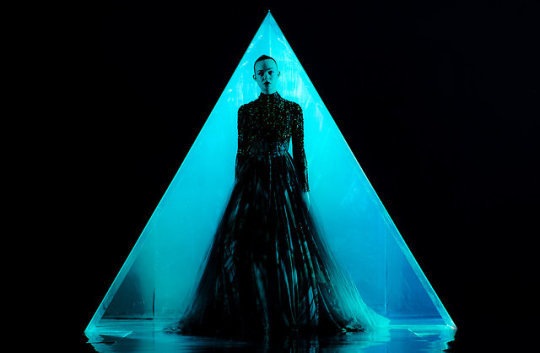
When aspiring model Jesse moves to Los Angeles, her youth and vitality are devoured by a group of beauty-obsessed women who will take any means necessary to get what she has.
Verdict: The Neon Demon has grown to become my second favorite movie from Nicolas. The film succeeds in shedding light on the hedonistic lifestyle of deranged young women in a tongue-in-cheek, almost satirical fashion. It’s one of the best looking Refn films to date, with even banal or commonplace locations drenched in neon hues. Composer Cliff Martinez outdoes himself with the synth-heavy score which guides the audience along a fairytale of horrors. In Refn’s surreal vision of Los Angeles there is no such thing as going too far to reach fame, even if it means bloodshed. As one character says in the film: “Beauty isn’t everything, it’s the only thing.” It would be nice to write off this statement as pure subjectivity, but what else has the media taught us but this ideal?
#1 - Drive (2011) Runtime: 1 hr 40 min Aspect Ratio: 2.35 : 1 Film Format: Arri Alexa & Cooke S4 Digital
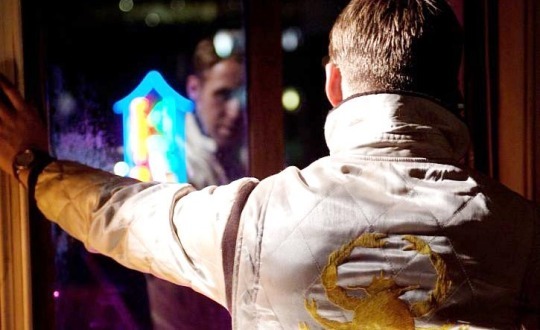
A Hollywood stunt performer who moonlights as a wheelman for criminals discovers that a contract has been put on him after a heist gone wrong.
Verdict: Seeing Drive in theatres back in 2011, without even having seen a film from Refn and not knowing much of the plot in general, is hands down one of the most memorable and inspiring theatrical experiences I ever had. Drive, among many other films that came out around that time, acted as a catalyst for me to branch out and discover more independent and arthouse filmmakers. I believe that it is undoubtedly Refn’s best film, and I might dare say that might be credited to the fact that is one of the only Refn films in which he didn’t write. These characters, while quiet and mysterious, have more depth to them than any of his others. The quiet romance between Drive and Irene provide more emotional stakes than any of his other works as well. All the elements of Drive complement each other and build off of each other. As cheesy as it may sound, if any film could be considered cool - it’s this. It’s already gained a cult status and it will most definitely go down in history as one of the most beautiful crime noirs ever made.
#drive#nicolas winding refn#the director's series#favorite directors#cinema#film#ryan gosling#the neon demon#elle fanning#jenna malone#oscar isaac#carey mulligan#valhalla rising#mads mikkelsen#vikings#only god forgives#bronson#tom hardy#pusher#the pusher trilogy#pusher 2#pusher 3#bleeder#too old to die young#miles teller#fear x#christina hendricks
46 notes
·
View notes
Text
Let’s Go in the Garden - Ch. 10
We change the POV characters - several times.
I woke up from confusing dreams about Nightingale undoing his top button and/or wearing one of Bev’s pencil skirts sweaty and with an uncomfortable half-hard-on. Beverley, half-awake herself, tried to nestle against me, but it was so hot in our bedroom that this just made me groan.
“Too hot,” I complained.
“Come swimming with me,” she murmured in my ear, and that I did.
It was a very special kind of experience, being with her in her river, as she kept me from sinking, as we didn’t even have to come up for air. Feeling her body against mine, familiar to me and yet unusual with her new little bulge. That was our baby in there, the new life we had made together.
It’s enough to get a guy a little sappy, is what I’m saying.
And for many wonderful moments I was nowhere but with her, doing nothing but this.
Then David whispered in my mind, Try not to think of me and Thomas when you make love to her, and of course it was like being told not to think of a pink elephant. I remembered him saying that, wondering one second why he’d ever think this would be an issue, when being with Bev like this had me feeling so good, so complete and content, and the next second I was back to Nightingale’s top button and the sheen of sweat beneath his collarbone and the feeling of him atop me, and David and his lips and his kind, sad eyes, and the concept of Nightingale and David and how it would feel to witness that.
I groaned into Bev’s mouth, and I felt her gripping me tighter. We were in her river. Did she know what I’d been thinking? I wrapped my arms around her, pulling her closer, nuzzling against her shoulder, drowning myself in her and only her.
—-
Thomas woke as he always did, with a gasp and a start, like breaking the surface of deep, dark, troubled waters. He’d dreamed of the war again. This was nothing special after such a long time.
He wrenched his eyes open and lifted himself up on his elbows, attempting to replace the images behind his eyelids of the mangled forms of his school friends with the familiar, calm, tranquil view of his bedroom. Gradually and in fits and starts, his breathing calmed.
He peered at his alarm clock, which showed ten minutes after seven in the morning. “Surely not,” he muttered out loud to himself and laid back down. He could remember, vaguely, a time when getting up in the morning had actually been accompanied by joyous anticipation of what the day might bring. Nowadays, distressingly often, Molly still had to badger him into getting up at all.
Well, he had about twenty minutes until she’d come around to loiter in the doorway and stare menacingly. So Thomas took stock. Extremities: attached. Heart: working. Magical ability: intact (he cast a small werelight and extinguished it again). Mysteriously sustained eternal middle age: yes, still. That strange bubble of heavy nothing that had made its home within him sometime after the war and rarely ever totally went away: yep. It was still there and still numb, like an atrophied limb. Generalized existential dread: the usual. But there was… oh boy, there was something else, wasn’t there?
David, he thought. David.
David’s face just yesterday after their fight. David… not trying any longer. He wasn’t usually one to back out of a fight. Maybe Thomas had… pushed too hard.
But what else would he have done? It was… so much at once, after such a long time of nothing at all. Why would David not just let him be? To process the new state of things at his own pace? Was that too much to ask? Why did they have to settle everything now? They would get lots of time to themselves when Peter took paternal leave. Wasn’t that soon enough to figure things out in peace? Ugh, but David was always trying to get into things and break them open and apart and assemble them anew until they suited his tastes. But Thomas wasn’t one of David’s damned experiments. He resented being broken apart and reassembled. Things had been working fine when David had still been dead to the world, resting in peace or, as the people of his faith preferred, his memory a blessing. Thomas had always rather liked thinking of him like that: his memory a blessing.
(Well, he’d thought that of late. Once David’s absence had stopped smarting every day like a phantom pain. Once he’d settled into how things were, and it all started to feel less… close to him. The bubble of heavy nothing had eclipsed the raw pain. The bubble of heavy nothing had eclipsed a lot of things.)
And now David had given up on him, indomitable David. There was… a kind of hurt to it. It simply had been inconceivable up until now that this was something David could do. It had always been Thomas-and-David, it would always be Thomas-and-David. What was the point to the continued existence of Thomas and David as two independent things, not one whole, united, together? They were but a few rooms apart, and yet they seemed further from each other than at that time when they’d been on different continents.
He’s been back a week and I’m already taking him for granted, Thomas realized. But what was he supposed to do? Go to David and apologize? Let David inside, let David crack him open like some kind of geode for all the world to see his insides? It is that or letting him slip away.
Noiselessly, the door cracked open. Molly let herself inside.
“I’m up, I’m up,” Thomas hurried to assure her as he rose. She had a way of communicating Get your sad arse out of bed without ever utilizing words or, that approach failing, prodding him with the feather duster. Her jabs to the rib area were downright vicious.
Thomas threw on a robe and hastened to the en-suite, where Molly only appeared to him anymore when genuine need commanded it.
—-
David woke up with the tempest in his chest not having quieted even a bit. He’d caught a few snatches of unsatisfactory sleep, and if anything, he felt more tired than the previous night. The memory of the fight with Thomas continued to plague him, the icy and complete rejection in Thomas’ eyes. There was nothing for it now, simply by not being there when he should have been, when it would have counted most, he had lost Thomas forever. And trying to come on to Peter, well, that had been a harebrained idea which clearly nothing was going to come out of.
What was he going to do now? Where was he going to go next, now that no one wanted him here at the Folly? It suddenly occurred to David that there was nowhere else for him to go. The war had robbed him of all his close friends, and time would by now have taken his family away. Mother, father, great-uncle Aaron, great-auntie Tzipporah, even his baby cousin Ruth was most likely either a very old woman or dead now. David suddenly remembered that he’d left them all with the impression that he’d killed himself. This they had not deserved. Had they rent their clothes? Had they sat shiva for him? Would Thomas and Peter know the correct things to do, all the little rites to perform, in case…?
He shook himself. Here he was, getting all morbid again. He couldn’t die now. But he found himself gripped, again, by the urgent wish to get away, to flee to somewhere no one knew his face or what he’d done. Somewhere he could rest, somewhere he could truly be at peace.
But he couldn’t do that either: not with the inhibitor cuffs. Besides which, maybe once was justified, but twice… was simple cowardice. (And he’d never forgive himself, if he ran again but left Thomas to stew in his misery.)
He was backed into a corner here.
For one very silly moment, he considered simply… staying in bed. Sequestering himself in his room and wasting away into nothing. Then he’d be out of everybody’s hair.
But frankly, David wasn’t the sort of person who wasted away, and Molly wouldn’t let him anyhow. So he got up, sighed deeply, and faced another day.
—-
Nightingale hadn’t done up his top button today either, seeing as the heat persisted. I found him in the breakfast room, a half-cleared plate in front of him, staring listlessly at the newspaper.
“Morning, sir,” I said - trying not to show how much his top button upset me. His tie was a bit loose, and he hadn’t parted his hair as accurately as usual - a sign that the end of times had clearly not been cancelled yet.
He looked up like someone coming back from a long mental journey. “Ah. Good morning.”
“About yesterday,” I said.
Nightingale put the paper down. “Yes?”
Your boyfriend tried to kiss me.
“We should really follow up on the theatre ghost.”
Your boyfriend tried to kiss me and I almost didn’t stop him.
I was glad I hadn’t said that - Nightingale looked relieved to turn his thoughts to our investigation. I didn’t want to make things even more complicated.
“By all means,” Nightingale said. “I don’t suspect it actually is a ghost at all, do you?”
It was probably purely rhetorical, but I was tickled pink to be asked for my opinion.
“A person dressed as the Phantom doesn’t necessarily equal actual phantom,” I said. “They’ve got a huge room full of costumes. Our ghost could have simply grabbed one.”
“Quite so,” Nightingale agreed. “What we felt weren’t the sort of vestigia you’d expect from the place, they were specific to a live person.”
I nodded, feeling something like relief at watching the life seep back into Nightingale as the discussion got more animated. He stopped pushing his kedgeree around on his plate and actually loaded up his fork.
At that point David entered.
If anything, David looked worse than yesterday. He looked like he hadn’t slept at all. He looked like he’d either caught the flu extremely badly or spent the night sobbing hysterically into his pillow. He looked like shit, is what I’m getting at.
Nightingale dropped his fork and stood up, like the gentlemen in a Jane Austen movie adaptation will do when the beautiful leading lady enters. (Don’t ask me how I know about Jane Austen movies, okay? I watch them for the architecture. Those manor houses, you understand.)
“David,” Nightingale said.
David didn’t meet his eyes. He shuffled over to the buffet and began filling a plate. “Good morning, all. Not to worry, I’ll be quick.”
He sounded… like nothing. He sounded dead.
Nightingale opened his mouth, doubtlessly to say something really, really, really stupid. Oh, fuck. Then his eyes wandered from David to me and he snapped his mouth shut and sat back down. I suppose he had decided that whatever he was going to say or do was not going to happen in front of an audience.
“You said you first felt that glamour in Ms. Watley’s dressing room,” Nightingale said to me, visibly fumbling for his composure.
I nodded. “Do you think she’s the ghost?”
“For now, I think we should pay her another visit.”
David looked up from where he was shovelling food onto his plate, apparently having listened in. “I could be of help,” he offered. “If I provided…”
I made throat-cutting motions in his direction, hoping to convey a general sentiment of “Dude, just don’t.”
Nightingale’s hand clenched around his fork. “No. No more tampering with the investigation.”
David nodded stiffly, hunkering down again into his bodily retreat. “I see. I’m sorry.”
Nightingale blinked, once more opening and closing his mouth. “Look, all I meant to say–”
“If you’ll excuse me.” David poured himself a cup of coffee, put it and his plate on a tray and headed for the door. “I’ll be taking this down to the basement.”
I watched his retreating back and I just… had to say something. This didn’t sit right with me. This didn’t sit right with me at all.
What came out of me was, “You’re going to eat in the lab? Isn’t that unsanitary?”
He barely turned his head towards me. “I don’t have any sensitive experiments on at present. How could I? And I do clean up, you know.”
“I can bring you some… disinfectant down.”
David was already pulling the door shut behind him.
“Well,” I said. “That went colossally to shit, huh?”
—-
“Well,” Peter said. “That went colossally to shit, huh?”
Thomas kept his mouth shut, because he wasn’t in the habit of snapping at his apprentice, and he wasn’t going to start today. Peter had come in just earlier with that loose, relaxed air, and smelling faintly of Beverley Brook’s glamour, in the way that made it indubitably known that he’d gotten lucky this morning. And Thomas had pursed his lips and thought, Good for him, and only that, good for him, because there were some sentiments one simply did not voice, not even in the privacy of one’s own head.
“Peter,” he said, keeping his tone polite, “I’m going to suggest you mind your business, yes?”
Across the table, Peter looked surprisingly rebellious for a moment. “I just…” he picked nervously at the tablecloth, most likely entirely without noticing. He huffed with momentary frustration. “I give a shit, you know.” Belatedly, he added, “Sir.”
Thomas was tempted to ask what about. He didn’t. Cruelty towards Peter was far from him. And with Peter, probing even the slightest amount towards any hint of his deeper emotions constituted a cruelty. In that way, he reminded Thomas of the boys he’d grown up alongside at Casterbrook. Of himself a long time ago. All the posturing, all the har-de-har, rugby and explosions and machismo. It seemed tiring, after tasting of the tenderness that came with spaces populated by men of the grecian persuasion. He’d have stayed wed - stayed shackled - to that kind of mindset forever if it hadn’t been for David, and the realisations that arrived with David. David had cracked him open (yes, once before) and taught him to be gentle.
In all, David had made him a better man before making him worse. But Thomas still didn’t like to dwell on the ‘worse’ part, not even 75 years later. It had been war. Things had been done in war that had been, if ugly, necessary.
David had been looking summarily horrible just now. He’d been looking horrible more or less constantly since he’d been back, like he’d spent his every unobserved moment crying his eyes raw. It ripped fiercely at Thomas’s heartstrings, seeing him like this. He had to do something - he knew not what, but something - before the day was out.
But work - duty - came first.
Peter picked out the actress’s address, and off they went. In an admission to the weather, Thomas left his suit jacket at home and rolled up his shirtsleeves (Peter observed this keenly, and not for the first time, Thomas wondered what on earth he was thinking that constituted a look like that). The heat was stifling, even driving with the windows down, and Thomas was sure he was leaving armpit stains on his shirt, and internally this bothered him more than perhaps it should. If only it was acceptable to attend work in more casual attire, such as, for example, a light sundress.
But he wasn’t quite that far gone yet.
—-
Cora Watley lived in a tiny studio apartment probably reflecting her actor’s salary. She had said that this was her first time playing a lead. She hadn’t been in the business long, and the kind of money she earned showed it.
She looked from Nightingale to me and asked, “What do you want from me now?”
Dull shock wasn’t that unusual of a response to being greeted at the door by two policemen. It didn’t even necessarily connotate guilt. Police at the door is rarely a welcome surprise for anyone, and most people possess some weird baseline guilt deep down when looking a cop in the face. Maybe Ms. Watley was involved in the murder, maybe she was only dreading another boring hour of answering questions, maybe she was thinking “Gosh I hope they don’t know about me illegally downloading music/that I smoked weed once in eighth grade/that I’m cheating on my partner with the cleaning lady”.
And yes, cleaning lady definitely applied here, as the humongous rainbow flag covering one wall of the bedroom/living room/kitchen conveyed. Nightingale looked at it and his face… softened, and he almost-smiled, and I thought, well, if Ms. Watley wasn’t flat-out the murderer, she had Nightingale on her side now. Solidarity, or something.
“We don’t want to bother you for long,” Nightingale told her. “We simply have a few follow-up questions regarding the scene of the crime.”
Ms. Watley didn’t ask us to sit down. The only opportunities for doing so would’ve been her bed, a bean bag in a corner and a singular kitchen chair. I knew I’d have to leave the chair to Nightingale if it came to it, and I didn’t want to sit in the bean bag. The bed was right out.
Ms. Watley didn’t sit down either. She leaned against her dresser, crossed her arms and said, “Okay?”
She said this with a pretty obvious question mark, “Okay?” It said in one word that she had already been asked tons of things, and did we really have to bother her at home for this? But she’d comply because what else was there to do, and thank us to be out of her flat quickly.
Nightingale decided to be direct. “Since you’ve started working at the theatre a year ago, have there ever been any rumours regarding a theatre ghost?”
“A… ghost. Really?” The actress cocked her head in bewilderment. “Like, I don’t know. I guess there’s always superstition and stuff with actors. But how is that in any way relevant?”
“I beg your pardon?”
While Nightingale gave the actress his famous emotionless face, I took a stealthy look around the apartment. There was no esoteric paraphernalia here. Apart from the rainbow flag, there was a collage on the opposite wall made up of posters advertising plays at different locations in and around London; I assumed these were plays that Ms. Watley had appeared in. The tiny bookshelf was crammed full of scripts and treatises on acting technique, accompanied by a little mainstream fantasy. A book of folklore that I vaguely knew: it was in the Folly’s mundane library, but it wasn’t the type of book that was exclusive or difficult to get. I still made a mental note of it.
“I mean, how is this relevant to the murder,” Ms. Watley said. “Like, what kind of thing is that to ask for a police investigation?”
“It’s purely a matter of routine,” Nightingale assured her - once again.
“We’re just covering all our bases,” I threw in. “It helps us gain an understanding of our crime scene. The dynamics at play between the actors, possible motives. Sometimes a ghost isn’t… necessarily a ghost.”
The actress’s frown deepened. “What, like sometimes it’s an old man in a costume? Like in Scooby Doo?”
Nightingale looked blank, of course. I said, “I wouldn’t have thought Scooby Doo, exactly.”
Ms. Watley snorted. “You’re completely lost with this, aren’t you? You haven’t got a single clue, and now you’re asking people about ghosts?”
I exchanged a look with Nightingale. If it worked as an excuse and let us ask our questions, so be it. But I didn’t want to make us look bad, either.
I settled for simply leaving it uncommented. “So you wouldn’t say you’ve ever noticed anything ghost-like, or anything at all strange or unusual around the place?”
“No,” Ms. Watley said - maybe a bit too vehemently. Then, after a moment of contemplation, she added, “You know, they say a lot of crimes go unsolved.”
“What’s that supposed to mean?” I asked.
She shrugged. “I don’t know. Probably nothing. I just… actually, I hope you find whoever did this to Deirdre. She was never… you know, she never did anything to anyone. She was a nice lady with a kooky hobby, and that’s all. This should never have happened to her.”
“And do you know why it did?” Nightingale asked - softly, but in the way that hides steel underneath. “Anything at all?”
A beat passed, and I thought, maybe…
“No,” Cora Watley said. “No idea. I realize this just sounded… super weird and possibly incriminating. I just think it’s… not fair, karmically.”
“You’re a believer in karma?” Nightingale asked.
“I’m not fond of the concept of bad things happening to good people,” Ms. Watley said, and that seemed to be all.
(”An idealist,” Nightingale summed up later, but I wasn’t so sure. We were both in agreement that something seemed majorly fishy here, and I was convinced that at some point, if not the whole time, we might have simply been lied to.)
Nightingale wanted to head back to the Folly, probably to check on David finally. But we weren’t done yet.
We went back to the theatre, but found no one there and all doors shut. I had to check on my phone to see why.
“It’s Sunday.”
Nightingale blinked. “My goodness, is it?” He checked for himself and shook his head. “Well, well. Goes to show what happens once you let yourself get all wrapped up in…” He interrupted himself abruptly. “I suppose there’s nothing for it.”
“We’ll have to catch our suspects at home.”
Nightingale blinked. “Hmm? Oh, certainly, certainly.”
—-
Mr. Sheen, the director, wasn’t home.
(“He’s at his hunting club,” his wife told us, just a slight touch bitter. “I swear to god, the place is falling down around his ears and what does he do? Spend his every free minute at the damned club.”
“The place is falling down around his ears?” I inquired gently. “So it’s true that the theatre is struggling financially?”
Mrs. Sheen snorted. “Struggling? The owners are flat broke.”)
But we did manage to catch the janitor, cleaning lady and night watchman for a chat. All of them denied any knowledge of a ghost or any rumours concerning a ghost, and recommended we maybe ask the actors, as this seemed to be a sort of actor thing. To them, as they all swore up and down, the theatre had been a perfectly ordinary workplace until the murder had happened there. Mr. Singh’s wife brought out samosas. It was nie. They were good samosas.
Following our tip-off, Nightingale even called his new actor friend. He went out of my earshot to place the call, and returned with the news that there were no helpful rumours abound among the actors, either. We had seen the theatre ghost - but no one else seemed to have ever heard of it.
Either that, or they simply didn’t want to talk to the police about it.
We were just about to quit for the day and make our way back to our respective homes when my phone went off. It was the reply from Zach Palmer I had been awaiting: he had asked around a bit and found the person selling enchanted crystal balls to the public.
—-
The seller was a shlubby white dude sporting greasy white-dude-dreadlocks who tried to get us to call him Ainsel, but whose actual name turned out to be Darren Wendell, significantly less magical. He had apparently been sold not just one but half a dozen artifacts which all, it turned out, had something a bit wrong with them. Zach knew him on a kind of friend-of-a-friend-of-a-cousin-basis.
According to him, he’d gotten these items from a mystery source - he refused to name them. That was something I’d have to come back and check up on, but the murder naturally took priority. Yes, he admitted, the items were enchanted to elicit desire to obtain them - the overwhelming greed I’d felt from the vestigia. “How else are they supposed to sell?” he asked, and I shook my head and didn’t get into it with him.
But there was something else wrong with these objects, something a bit outside of Wendell’s sphere of competence. These enchantments had been attached to the items when he’d gotten them. He showed me a voodoo doll that was rumoured to actually work. A flask of perfume that smelled like your deepest desire (To me, it carried the scent I had come to associate with Bev’s river. Nightingale sniffed it and made a face.). A book that mildly possessed the reader, who got compelled to read it in one sitting. A mirror that was supposed to show your future self, which Nightingale looked into and claimed it had to be broken. A little music box which played a melody that would put anyone listening right to sleep. So far, Wendell had only sold the crystal ball.
“Demi-monde seem less affected by the enchantment,” he told us, “they just… react less than outsiders.”
“So what on earth compelled you to sell to a woman who was completely unaware what she was dealing with?” I asked.
Wendell shrugged and gestured at his assortment of… stuff. “They wouldn’t sell on the goblin market.”
I turned to Nightingale. “What’s the law on this kind of incident?”
“How do you mean?” he inquired.
“I mean, selling hazardous magical artifacts to people with no qualifications to handle said artifact… endangering the public… surely there’s some rule or regulation to deal with that?”
Nightingale looked blank again. Of fucking course.
“Seems like one more item to add to your list,” he said, in a tone as if he or the universe in general was doing me a favour. It cost me a Herculean effort not to groan out loud.
—-
The Folly was quiet, very quiet. David couldn’t remember it ever being this silent here. Before the war there’d always been somebody milling about: the other researchers (none of his quality, but good chaps anyhow) in the surrounding laboratories, the fellows upstairs having their little convivals in the smoking room, and then of course the commotion of everybody meeting up for meals. Then later it had been people practicing in the firing range and gym, prior to being carted off to learn the uses of mundane weaponry within the army’s basic training (David still had rather pleasant memories attached to boot camp, revolving around Thomas in his PT gear). And after the war… the survivors, who had gradually begun filing out, leaving the Folly and the arts and wisdoms behind, unable to stay, too haunted by the empty rooms, the empty spots at the dinner table. (And then David, too, had reached his limits and had had to leave.). Groaning and yelling and whimpering at night, and yet still, at the very least a sign of life at all, and better than nothing.
David told himself not to be silly. Sure, they didn’t make a sound, but Molly and Foxglove were still very much within the building. He wasn’t alone. And Thomas would be back in the evening; Peter too, perhaps, if he didn’t go to see his orisa. It was simply… unusual for the Folly to be so quiet, that was all.
(Was this what Thomas had lived with for the last seventy years, this silence?)
David shook his head, hoping maybe to dislodge the cobwebs that these thoughts spun in his head. He focused back on his experiment.
Yes, there was an experiment: one of the very few he could conduct without actively using his magic. What he was currently putting through the works, clamped under his microscope, was a single, pale hair.
Oh yes, a single hair, one that he’d been so very fortunate to pluck off the back of a chair. Much could be told by a single hair.
(Of course when he’d developed this procedure first, long ago, before 1930 even, David hadn’t asked himself why. Hadn’t asked himself how people would abuse it. Hadn’t fathomed yet of Nazis, of what they would use his research to inflict on the demi-monde.)
(For the nth time he ground his teeth and cursed them, the ones that had built Ettersberg on the grounds of his knowledge, knowledge he had shared freely, for the benefit of all, a scientific Commons…
“Bullshit,” he whispered harshly.)
That was what Thomas had never understood: the scope of the betrayal. How they’d stripped him off his selfhood and butchered his work, and butchered hundreds of thousands utilizing his work in the name of their twisted, blood-thirsty nonsense ideology. How parts of the accursed mountain had smelled so faintly of his magic, or something born of his magic. How many of these self-proclaimed Aryans would have recoiled had they known that their instruments of torture were based on the discoveries of a queer Jew? How many would have pragmatized, and justified, and rationalized, and had in fact done so…?
Oh, some at Abteilung Geheimwissenschaften had known. For that there existed not a sliver of doubt. David knew their names, their faces, as they’d known his.
Here he had to pause, and brace his hands on the lab table, and calm his breathing until the nausea faded.
A fine red mist.
In retrospect, so much of it was covered by a fine red mist.
But he managed to shake himself out of it and return to the pale artificially-blonde hair.
The results were clear.
“Gotcha,” David muttered.
He could contribute. Now Thomas might as well get off his high horse about it.
He reached over for the flat rectangle they called a telephone nowadays. So many different uses to it, and you could carry it around in your pocket. The future was splendid.
He sent a text message to a number he had acquired on the same day he’d managed to pinch the hair.
I know what you are.
Oh dear, that sounded unduly menacing. Menacing was unnecessary.
That is to say, I know in which way you are different, David amended. And I think I know what you are doing.
I know you’ve been going it alone, and this cannot continue. You’re handling something you barely understand. I can help you.
And then, he waited.
He waited two minutes, three, five. Then, he got his answer.
What are you? she had written. Really.
I’m with the police, David fibbed a bit. Well, in a wider sense, that was true.
This time, he had to wait almost fifteen minutes for his answer. It felt like an eternity, and he was awfully fidgety by the time it arrived.
I want to meet.
“Good.” David nodded to himself. He shrugged out of his lab coat and went to follow his lead.
—-
Thomas did not consider himself a timid man.
He had walked through bullet hails and shrapnel rain without sustaining a scratch. He had killed Nazis in about every way a person could kill another, including with his bare hands and, one one occasion that still came back to him in the odd nightmare, with his teeth. He had lived risking complete ruin for the horrendous crime of his loving since he’d been a sixth-former. Cowardice was not a trait Thomas considered himself guilty of.
And yet, how his heart pounded in his chest as he made his way down the steps, along the hallway up to David’s lab.
Once, long ago, it had been normal and natural for him to go here, to pop in for a chat with David, or just to watch David work. Then, for decades, he hadn’t gone here at all. He’d willed himself to forget this room existed.
Now it still felt strange, visiting here. Normalcy had not yet returned to them. And how could it have? But Thomas wanted it to, he found. He wanted to settle things with David, and they would. They would talk, in depth, about everything, just so.
There was no light on in the lab. For a second, something black and frenzied wrenched again at Thomas’s heart - for a second, he feared the worst. But surely not. Certainly not. He couldn’t be too late twice over. This time, a second time, he knew his mind would not bear it. It had been hard enough to come back from the first time. A repeat of it would push him past what he could in sanity endure.
He opened the door and found… nothing. David wasn’t there.
And what did Thomas feel? Something sinking. Something between relief, disappointment and trepidation.
Which was nonsensical. David was simply somewhere else within the building.
As if on cue, he heard a rustle behind him. He turned, but it was only Molly.
“Molly, splendid,” Thomas said. “Do you know where David is?”
She procured something from the folds of her dress and gave it to him. It was a piece of paper - a note.
Thomas took it and read it. In David’s loopy handwriting, it said, “Actress is a demi-fae. Will get back to you later.”
What?
#david mellenby lives AU#posts by me#posting this at charlotte's place bc my wifi is still brokeeeeen!!!!!#rivers of london
21 notes
·
View notes